#like....there are so few good anti heroes like him in pop culture
Explore tagged Tumblr posts
Text
KAMEN RIDER MEGAPOST
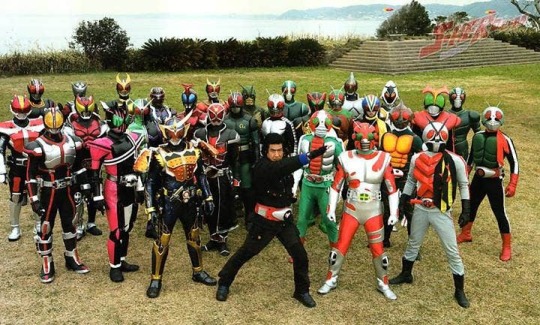
I've been deep in the Kamen Rider hole after taking a blind chance on it about a year ago and it's been one of the most rewarding discoveries I've had, so I'm doing a megapost where I try to convey what's so interesting and unique about this series that you can literally just start anywhere. There's a Kamen Rider series for everyone, and I hope to convince you of it and point to where you can give it a try for yourself. Click on the read more to see more!
WHAT IS KAMEN RIDER?
Kamen Rider is a superhero that rides a motorcycle who's often bug-themed, but not always. The Kamen Rider franchise started in 1971 and, with the exception of a few periods of dry spells, keeps making new yearly series to this day. It's part of Japan's many, many decades old craft of special effects-focused TV shows and movies, called "Tokusatsu" (literally, "special filming"). It was conceived and spearheaded by Shotaro Ishinomori, an incredibly famous mangaka in Japan, responsible for not only Kamen Rider, but also Super Sentai, Cyborg 009, Zubat, Kikaider, and many other TV series and mangas. The amount of works he has produced in manga and TV is incredibly huge, and his works have been incredibly influential to Japanese culture as a whole. Kamen Rider can be argued that is his biggest, most important contribution.
A consistent theme in early Kamen Rider series is that he's a lonesome, grieving hero, in which his sadness fuels his righteous anger at the evils that he's fighting against. He's been transformed into a monster against his will, and now must fight against the very forces that created him. In every Kamen Rider series, the power that the protagonist wields is the same power that fuels the evil forces he fights against. In a way, you can see it as a metaphor for Kamen Rider's production itself: It must use the evil power of mass media to carry its anti-authoritarian messages that go against the very forces that even allow it to exist. It's the tale of every artist trying to create something earnest and culturally and artistically enriching in the cynical mass media space.
WHY WATCH KAMEN RIDER?
I was never really sold on Kamen Rider at first. I remember watching a bit of Kamen Rider Black when I was very young, so I was always nostalgically curious about it. But whenever I saw the newer Kamen Rider stuff pop up on Twitter or whatever, I had always dismissed it as "eh, whatever bug bit you I guess made you interested in that". Something about the super toyetic costume designs and super fake CG just never really inspired my attention, and it was easy to dismiss it as something for kids, something in that same place in my mind as "what shonenheads are into". I guess what I mean is that I saw newer Kamen Rider as "low art". It's easy to categorize it as such, people in silly suits selling toys, doing really silly comedy, with silly CG. I've seen Power Rangers before, it's just that. It has to be cynical!
I had never done such a big 180 before. Yes, Kamen Rider is "for the kids" (with some exceptions), yes it has a ton of silliness to it, but there's also a lot of good cinematography, fantastic stunts, and really great, serious drama. Kamen Rider is seen as a cultural institution in Japan for all those reasons. It's a way to keep a lot of theater traditions alive in a modern space, a way to have many young, extremely talented actors have a big break, a way to keep tokusatsu traditions and craft (analog special effects, stuntmen, martial arts actors) alive, employed, and continuously evolving, to create something that bridges the gap across all generations in Japan.
It's difficult to explain, but Kamen Rider has the important positive qualities of extremely good older television like Star Trek and Columbo. A TV show that doesn't want to aspire to be a hollywood movie like Netflix series cheaply try to do, but that sees the value of theater and theater skills in television.
Another thing to note is that because Kamen Rider is such a huge cultural institution, if you enjoy anime and japanese video games, there's so so much about what you love on your favorite anime and games that are directly inspired by Kamen Rider. Every japanese action game you've enjoyed? Ninja Gaiden, Shinobi, Devil May Cry, Viewtiful Joe, Hagane, Bayonetta, they -all- have an incredibly huge amount of Kamen Rider in them. Nearly everything Gainax, Hideaki Anno and Studio Trigger made. Pokémon, Digimon, Dragon Ball, One Piece, Yu-Gi-Oh (especially on the superb monster designs), Taiyo Matsumoto, every japanese character that has ever stricken a dab. It's not just references, there are fundamental things about pretty much all of these games, mangas and animes I've listed that are directly attributed to Kamen Rider. So if you enjoy anything I've listed, you ought to give it a try.
OKAY, WHERE TO START?
One of the greatest things about Kamen Rider is that since every series is its own closed continuity (there are crossover movies but they largely don't matter), you can pretty much start anywhere you'd like. Of course, with this many ice cream flavors, one can't help but become paralyzed by the abundance of choice, even though, and I can't emphasize this enough, every Kamen Rider series I've watched so far have all been pretty good to fantastic. I'm sure there's a couple of stinkers I've avoided, but a hitrate like this feels miraculous, I don't understand how does Kamen Rider from so many different eras can keep such a consistent quality even when they can feel so different from one another and be spearheaded by such different creators. You can maybe look them all up and decide what theme you're most attracted by, or, I can maybe help you and tell you about the ones I've watched!
So, here's a list of the Kamen Riders I've watched, with short descriptions of each of them and what makes them appealing, and a mini-list of recommended episodes to sample, in case you're still not sure whether to jump in:
SHOWA ERA (1971 - 1994)
KAMEN RIDER (1971)
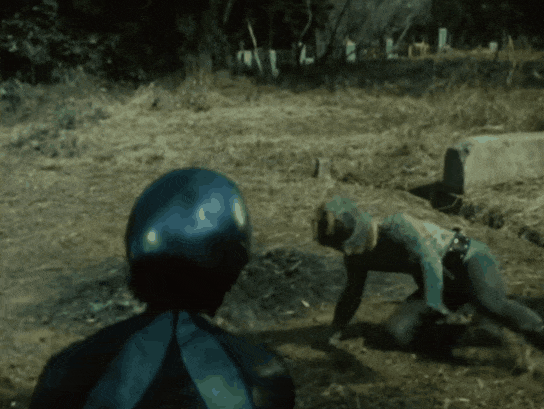
The original, and also the least I've watched so far, haven't even gotten to 10 episodes yet. It famously started with an incredibly small budget and it's magical to see what tricks the production employed in order to make it work and be exciting and fun while spending as little money as possible. The stunts are very dangerous but very cool to see. A long, very episode-by-episode affair, but if you get excited on cheap sets and cheap cinema tricks and special effects used very cleverly, this is going to light you up like a christmas tree. It also employs some thriller-inspired cinematography that is very exciting. The writing doesn't offer much substance, but it has this quality where it really believes in itself and in the ideals that Kamen Rider is supposed to represent that is very easy to feel wrapped up in. Might bore you if you're not already sold on the appeal of old tokusatsu.
RECOMMENDED EPISODES TO SAMPLE: Episode 6: The Grim Reaper Chameleon! Episode 7: The Grim Reaper Chameleon Showdown: Old World's Fair
KAMEN RIDER AMAZON (1974)

It's basically just the 1971 Kamen Rider but the main character is Tarzan. It runs only half as long as other Kamen Rider series so if you wanna do a whole Showa-era KR series quickly, it's a very solid recommendation. It's very violent for a children's show, with Amazon often slicing and mauling his monster opponents in bloody messes, and it looks really sick. The suits and special effects are better than how the original Kamen Rider starts off, but it still has that appeal of being old and budgeted for a TV show, which in this case is a huge positive, imo. Also again, the writing isn't much to write about, so don't expect big narrative payoffs or anything like that, you really have to enjoy it on an episode-by-episode basis, which is fine, because the monsters and special effects are extremely cool, the characters are charismatic, and the little episodic plots are fun.
RECOMMENDED EPISODES TO SAMPLE: Episode 4: Run! The Raging Jungler! Episode 11: The Golden Snail is the Grim Reaper's Envoy!? Episode 16: Garanda's Tokyo Sea of Flames Operation Episode 17: Mt.Fuji Big Explosion?! The Tokyo Fry Pan Operation
KAMEN RIDER BLACK (1987)

This was supposed to be a revival of Kamen Rider into public interest after being dormant for a while, so it also feels like a retelling of the first Kamen Rider in a sense, has a lot of common elements, but with slick 80s production and sensibilities all over. If you love how 80s action, sci-fi and thriller movies look like, you'll love the cinematography and production of Kamen Rider Black. It's edgier, sleeker, and even scarier, borrowing a lot of horror/thriller elements that were in vogue at the time, while still being a hopeful, heroic and uplifting presence for children. Has an overarching plot that develops over time but it's, again, really about enjoying it on an episode-by-episode basis, as the overarching plot develops veeeery slowly and in very small portions. I supremely love how this series looks, I love the special effects, I love the suits, and it has my favorite transformation sequence.
RECOMMENDED EPISODES TO SAMPLE: Episode 1: Black!! Transformation Episode 2: Monster Party Episode 18: Sword Saint Bilgenia Episode 20: Rider's Grave Episode 23: Marumo's Magic Power Episode 24: College Girl's Nightmare
SHIN KAMEN RIDER PROLOGUE (1992) (MOVIE)
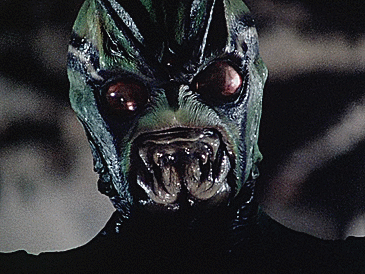
This doesn't have anything to do with the Anno movie, the Shin here is written differently. A movie that celebrates the series' 20th anniversary that tells its own story with its own Kamen Rider, so it feels like a "reboot" or "re-interpretation" of Kamen Rider. It's darker and scarier, with a Kamen Rider that looks much more like a monster than an armored hero, and leans more into the horror side of Kamen Rider, being more adult-focused. Very violent and very cool.
KAMEN RIDER ZO (1993) (MOVIE)

This was supposed to be a full-fledged Kamen Rider series but the 80s bubble popped and they decided to shift production into a short movie instead. Might be a good introduction point, since it's a short 1-hour watch, and has a ton of really great special effects. Everything that is great about Black's cinematography, propwork and special effects apply here, except since it's just one movie, they're really throwing everything they've got into it
HEISEI AND REIWA ERAS (2000-Present)
Kamen Rider went dormant in the 90s until it was revived back into its TV format by Kamen Rider Kuuga, which was a major success. Since then, there's been yearly new Kamen Rider series on Japanese television, non-stop.
The difference between the Kamen Rider of old (Showa era) and the Kamen Rider series past this revival (Heisei, Reiwa) is that newer Kamen Rider series, despite also being monster-of-the-week romps, tend to have a more complex overarching plot which they tend to lean more into, and less of dangerous stunts and practical effects. Episodes also tend to be two-parters, so maybe calling them monster-of-the-week is innacurate, it's more like monster-of-every-two-weeks. This shift is fine because their reliance on denser plots with a much larger supporting cast of characters, more than makes up for it. It feels less that they're stretching episodes into two-parters and more like they're filling these episodes with so much other stuff that making them 2-parters makes sense.
Also, to note, as modern Kamen Rider goes on, there's more reliance on CGI, but all the monsters (and Kamen Riders) are practical suits and there's still plenty of practical effects, so don't let the super artificial candy-colored videogamey CGI effects trick you into thinking that that's all there is to modern KR.
KAMEN RIDER KIVA (2008)

Kiva is the only "Heisei phase 1" series I've watched so far (early to late 2000s), and I absolutely love it, one of my favorite Kamen Riders. It's considered to be a bit of a black sheep of Heisei phase 1 Kamen Riders but I think fans severely overlook and misjudge Kiva. Kamen Rider Kiva is vampire-themed and is about this shut-in, extremely shy boy who, mysteriously, is also the heroic Kiva, that springs into action whenever Fangires (vampire monsters) are about to kill humans. However, it also takes place 20 years before, in the 1980s, where Fangires are also attacking, but there's no Kiva around to stop them. Instead, humans have created a secret vampire-hunting association and are developing their own technology to stop them. What's the connection between the characters from each time era? Mysteries...!! It has a large cast of characters and incredible soap opera drama and romance that'll keep you heavily invested in all of its twists and turns. It's a very narrative affair which makes it difficult to recommend episodes out of order since it can be confusing to catch things out of context. The fact that it takes place both in the 2000s and in the 80s means every episode has both an A-plot and a B-plot, which avoids the pitfall of some modern Kamen Riders of two-parters that don't have enough going on, because Kiva is absolutely overstuffed with great characters and narratives. The drama is great, the romance is great, the comedy is superb, and the fights are awesome too. I really can't recommend it enough.
RECOMMENDED EPISODES TO SAMPLE: Episode 1: Fate: Wake Up! and Episode 2: Suite: Father and Son Violin (2-parter) Episode 17: Lesson: My Way and Episode 18: Quartet: Listen to Your Heart's Voice (2-parter) (I have trouble recommending more episodes out of order because this series is very narratively-involved!)
KAMEN RIDER W (2009)

W is a very well-received and loved series, and it's easy to see why. It's one of those things that if you watch it you immediately go "oh, if I watched this as a kid I would be so so into it". It has fun, charismatic characters that you want to see every week, simple to understand and easy to like. It's detective-themed and the Kamen Rider is actually comprised of a fusion of two people - Shotaro, who wants to be a tough, hard-boiled detective but is unintentionally kind of stupid and goofy and isn't seen very seriously by people around him, but has a heart of gold, and Phillip, who is an androgynous autistic introvert that basically has the entirety of Google inside his mind, and uses this to help find information to solve cases. Together they transform into Kamen Rider W (W as in "double", get it?), with each controlling a literal half of the suit (right and left), that they can switch properties of and create different combinations. They're great characters but who really steals the show is the comedy relief sidekick, Akiko. She's an immensely funny actress and character.
RECOMMENDED EPISODES TO SAMPLE: Episodes 1 and 2: W Search Episodes 9 and 10: S Terror Episodes 23 and 24: L on the Lips Episodes 25 and 26: P's Game
KAMEN RIDER OOO (2010)

OOO is another extremely beloved Kamen Rider series, and the one I actually started with. Its themes are "desire" and "currency", and the evils and necessities of living in a world that depends on them. The main character is a lovable homeless hippie (Eiji) who's egged on by his extremely androgynous edgy greedy demon boyfriend (Ankh) to collect "medals", because said demons are greedy for them and require them for power. These medals also allow Eiji to transform into Kamen Rider OOO (pronounced "Os" or "Osu"), and different medals can be slot into his transformation belt to create different combinations. Other demons, that are not Eiji's demon babygirl, want to use humans' desires as piggy banks to generate more medals for their own greed, at the cost of these humans' lives. Eiji needs to stop them and collect all the medals before they do. Again, easy to enjoy, easy to see why it's beloved. Filled with a light-hearted fun energy that you can feel as soon as you watch the ska-inspired opening. There's a small stretch of it that feels a bit by-the-numbers, but the drama ramps up and pays off immensely well as it goes on. An extremely fujoshi Kamen Rider series.
RECOMMENDED EPISODES TO SAMPLE: Episode 1: Medals, Underwear and a Mysterious Arm Episode 2: Desire, Popsicles and Presents (2-parter with Episode 1) Episode 13: A Siamese Cat, Stress and the Genius Surgeon Episode 14: Pride, Surgery, and a Secret (2-parter with Episode 13)
KAMEN RIDER FOURZE (2011)

Fourze is written by Kazuki Nakashima, the Studio Trigger writer responsible for stuff like Gurren Lagann, Kill la Kill and Brand New Animal, so that may be something that's either going to extremely excite you, or make you very wary of it. I personally feel he's not a very good writer, but that's okay, because the rest of the production is fantastic, and I still enjoyed Fourze a good amount! The main character is an extremely likeable and charismatic school delinquent that wants to befriend the entire school and creates his own Kamen Rider school club after being bestowed with the Kamen Rider Fourze technology thanks to, uh, a portal that sends him to a space base on the moon? So it's a half-and-half school theme and space theme Kamen Rider. The school club has a large cast of characters but the show doesn't really know what to do with them unless the episodes focus on a specific club member. Fourze really, really drags in the middle (this is when the problem of two-parters feeling stretched out when the writing isn't very strong hits hardest), but as it crescendos to its finale it gets -very- good again. This might be the weakest Kamen Rider out of the ones I've watched, imo, but still, I think there's quite a lot to enjoy here.
RECOMMENDED EPISODES TO SAMPLE: Episodes 1 and 2 (Youthful Transformation and Space Superiority) (2-parter) Episodes 5 and 6 (Friendship, Inside and Outside and Electric Shock, Steadily) (2-parter) Episodes 13 and 14 (School Refusal and Stinger Onslaught) (2-parter)
KAMEN RIDER AMAZONS (2016) (WEB SERIES)

Wait, didn't I review this one before?! No, no, this is AMAZONS, plural! It doesn't actually have that much in common with the original Amazon, being very much its own thing, and what it borrows from Amazon is mostly just to help frame this series as a more adult, violent affair, since Amazon, despite it being very much for kids, was back then known as "the violent Kamen Rider". It's also an Amazon Prime-exclusive series, so they did it for Branding, too. A very dramatic, violent, adult Kamen Rider show that's spearheaded by my favorite Kamen Rider director, Hidenori Ishida. He's a supremely good director that brings his A-game to this series. It follows an extermination team that hunts terrifying man-eating monsters called Amazons. There's two Kamen Riders, Alpha and Omega, that are also Amazons but they largely fight against other Amazons. Alpha is set on killing every Amazon, while Omega has just awakened into an Amazon and a Kamen Rider himself, and has to decide what he wants to do and who and what to fight for. At least this is the premise of Season 1, Season 2 I will not spoil but it is the production going "oh, Amazon season 1 did well enough for us to do whatever we want, and we'll do exactly that". It's the most well-equipped artists in tokusatsu breaking off their shackles and doing a dramatic magnum opus. It's dark, edgy, but also earnest and sentimental. It's my absolute favorite Kamen Rider show. Also, the fact that the monsters are called "Amazons" is used for extremely pointed stabs at Amazon (company), which is hilarious.
This series is completely narratively-driven, so I can't recommend episodes out of order! Watch the whole thing!
KAMEN RIDER ZERO-ONE (2019)
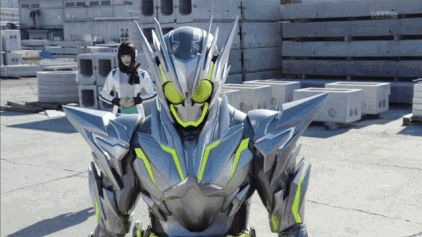
Robot-themed! Zero-One takes place in a future where robots and humans live together, like Megaman or Astro Boy. It's about the struggle of humans and robots to live in harmony with one another, and it develops those themes and its world extremely well. The main character (Aruto) is very goofy and wants to be a manzai comedian but his lame puns always bomb. He is, however, also the heir of a massive company that builds all the robot people! Aruto is suddenly, unexpectedly, thrown into the company as its President after his grandfather dies. This responsibility is too much for him, but he decides to take on the mantle as he wants to bring a smile to people's faces, and that he legitimately cares about robots, as he was raised and saved by one as a kid. With this in mind, he takes on his grandfather's KAMEN RIDER ZERO-ONE technology and uses it to attempt to stop a terrorist robot faction (METSUBOUJINRAI.NET) that's bent on killing all humans, and corrupting other robots for that goal. All while also trying to advocate for a harmonious relationship between humans and robots. This is honestly fantastic, and may seem super goofy at first but gets very complex as it goes on. Very great balance of lighthearted comedy and serious drama, and another one of my absolute favorite Kamen Rider series, right up there with Kiva and Amazons.
RECOMMENDED EPISODES TO SAMPLE: Episode 1: I'm the President and a Kamen Rider Episode 2: Is AI an Enemy? Ally? Episode 5: His Passionate Manga Path Episode 6: I Want to Hear Your Voice (2-parter with episode 5)
KAMEN RIDER GEATS (2022)

Battle-royale themed Kamen Rider, with a lot of inspiration on korean dramas and reality shows. It definitely feels inspired by, say, Squid Game. Gods select people to compete in a Kamen Rider battle royale, and the winner of the final round gets to remake the world in whatever way they see fit. The production is a bit cheap after the last two KRs before Geats underperformed, and they had to scale the production down. The fact that the series tries to convey the excitement of extremely high stakes so often only for those stakes to completely deflate thanks to how the premise works, creates a situation where you don't know what to care because anything can get undone and completely changed so often anyway. Near the end the series gets particularly bad with this. Still, it has some good characters, some nice drama and some fun comedy, so it's not bad, but definitely on my lower tier of KRs alonside Fourze. Again: No KR I've watched was bad! So, even the ones that might sound that I'm down on them I still very much enjoyed.
(Too narratively-driven to recommend episodes out of order! Try the first couple of episodes!)
SHIN KAMEN RIDER (2023) (MOVIE)

Hideaki Anno's film! Hideaki Anno is a huge Kamen Rider fan and it really shows throughout the movie, with a lot of pulls from the Kamen Rider manga specifically, while also being nostalgic for a lot of the original Kamen Rider TV show from 71. Still, it ends up feeling less like "a Kamen Rider movie" and more like "an Anno movie" with a Kamen Rider-theming to it. It doesn't put its focus on the stunts and the fight choreography that you'd see in other Kamen Rider productions, but more on Anno's style of cinematography, his sense of timing, special effects and animation. It also retreads several of the themes and elements that he's drawn from before, a lot of Evangelion is in this. It's good, I like it!
KAMEN RIDER GOTCHARD (2023)
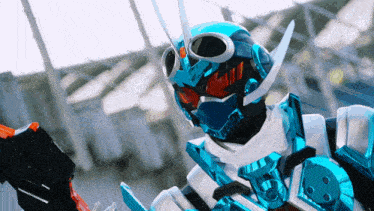
Currently ongoing! Very Y2K nostalgic, with a Kamen Rider suit that has that Y2K aqua color to it, and is themed around... Pokemon cards? There are these creatures called Chemys, that are contained inside alchemical cards that have been let loose and need to be captured again, or at least kept away from the villains. The main character is this super earnest, almost helplessly naively optimistic schoolboy called Ichinose that has been unexpectedly thrown into the secret world of alchemy and given the power to become Kamen Rider Gotchard, as a powerful benevolent alchemist dies in his arms. As a promise to him, he vows to find the Chemys. Ichinose also believes that they're extremely good-natured beings that are only corrupted by human malice, and really believes in the friendship of Chemys and humans, while other alchemists feel Ichinose's ideas of Chemys are too naive and soft-hearted. It's, uh, I don't know what to think of it, honestly! The first couple of episodes really did not sold me on it, but it gets better and better as it goes on, though, it's also, like, a lot of Big Important things keep happening in rapid-fire in a way that I can't tell whether the show has a higher plan for all of it or if it's just throwing things for easy hype. Nearly every episode there's a new Kamen Rider transformation, it's kind of insane. Still, this is preferrable than the stretches of not much happening that plague some other KR seasons. I've been enjoying it a good amount, honestly!
RECOMMENDED EPISODES TO SAMPLE: Episode 5: Burn! Fight! Wrestler G! Episode 7: Goodbye, Saboneedle
And those are all the Kamen Riders I've watched! Something else that can help you decide on which series to try out, is that the NHK made a public popularity poll of Kamen Rider series, with the results being found here! From here, you can tell which KRs are most beloved and well-remembered in Japan, and use that as a guidance for yourself, if you'd like. But again, I must emphasize, you can really start most anywhere, so feel free to do exactly that!
65 notes
·
View notes
Text
Taylor Swift’s Enemies – Her 15 Biggest Feuds

It’s crazy to think this pop legend hasn’t been feud-free since 2008…
Taylor Swift may have made millions of dollars since her rise to fame (and rightfully so), but she’s also made a staggering number of enemies, too (judge that by reading on).
Controversy has followed Taylor Swift for years now, and a lot of it has to do with her ongoing feuds. Outside her “Squad” of famous females are a handful of celebrities that have feuded with the Anti-Hero singer.
Joe Jonas and Kim Kardashian are just *some* of the stars who have had bad blood with the best-selling artist.
Want to know more? Here’s the tea – check out a list of Taylor Swift’s enemies over the years…
Joe Jonas – Bad Blood Since 2008
What Happened?
Taylor’s first boyfriend, Joe Jonas, also happens to be her first enemy. Her feud with Joe began in 2008 after he dumped her over a 27-second telephone call.
Although the two only dated for three months, Taylor held a grudge for two years (girls can be like that).
From discussing the break-up in interviews to writing a bunch of songs about him, Taylor and Joe’s brutal breakup went very public.
Joe then took a swipe back at Tay by singing the lyrics, “Now I’m done with superstars/And all the tears on her guitar” in his song Much Better.
Two years down the line and Taylor still had a bone to pick. Fans accused her of slut-shaming Joe’s then-girlfriend, Camilla Belle in her song Better Than Revenge, where it sounded like she was blaming Belle for “stealing her man.”
Come 2019, and Joe revealed on Lorraine that he and Taylor had “moved on” and were “all friends.”
Kanye West – Bad Blood Since 2009
What Happened?
If there’s one known fact about Taylor Swift, it’s her ongoing fight with Kanye West.
This monumental pop culture feud began in 2009 when Kanye stormed the MTV VMAs stage during Taylor’s acceptance speech for winning Best Female Video.
The rapper stole Taylor’s microphone and claimed that Beyoncé “had one of the best music videos of all time.”
*Collective gasp*
Taylor never let the shocking incident drop and sang about it in her track, Innocent.
Although the two kissed and made up in 2015, a year later, Kanye dropped his song, Famous, which contained lyrics that Taylor supposedly didn’t approve of.
The controversial rapper insisted she’d given the go ahead, but Taylor denied this and even dragged Kanye during her acceptance speech at the 2016 Grammy Awards, accusing him of “undercutting” her success.
A few rants and feuds later, it came out that Taylor was telling the truth, and had in fact not approved Kanye’s distasteful lyrics. Still, this feud has been quiet ever since.
John Mayer – Bad Blood Since 2010
What Happened?
Many critics would say Taylor has built her career on slandering her exes…
John Mayer gave Taylor more material to write about when he broke up with her in February 2010.
Retaliating to her song Dear John (which was based on him), Mayer told Rolling Stone, “It made me feel terrible, because I didn’t deserve it. I’m pretty good at taking accountability now, and I never did anything to deserve that. It was a really lousy thing for her to do.”
Despite going from lovers to enemies, John later told his fans that he was a fan of Swift’s Reputation, calling it “a fine piece of work.”
Continue reading at Tell Tales Online.
#taylor swift#swifties#swiftie#kanye west#midnights#anti-hero#reputation taylor’s version#the tortured poets department#ttpd
0 notes
Text









Consumer Guide / No.122 / writer Julie Burchill with Mark Watkins.
MW: What are you doing at the moment?
JB: I’m preparing for the one-night-stand on Brighton Pier on September 22nd of my play (written with my husband Daniel Raven) AWFUL PEOPLE. It was an unexpected sell-out during the Brighton Fringe festival and I’m delighted to be bringing it to the most gorgeous and, yes, ICONIC (I hate that word!) place in Brighton. There are a few tickets left - and I’ll be buying the drinks if anyone fancies it.
MW: What newspapers / magazines do you read?
JB: I’m lucky enough to write regularly for the only magazine / website I love - the Spectator and Spiked.
Julie Burchill, Author at The Spectator
Julie Burchill, Author at spiked (spiked-online.com)
If I buy a newspaper, it will be the Daily Mail, which I also write for. It’s arrogant, but accurate, to say that the newspapers which have sacked me have no merit - otherwise they wouldn’t have sacked me. Apart from Tomiwa Owolade and Gareth Roberts, I’m still the best hack around.
MW: Thoughts on two media moguls Robert Maxwell (RIP) and Rupert Murdoch...
JB: Those were the days! When I wrote my smutty novel 'Ambition' in 1989 these two were mythical figures, though my anti-hero Tobias Pope was a kinky sex fiend, which these two weren’t though Maxwell put it about a bit.
I was once in a lift with Mr Murdoch at my London home-from-home, One Aldwych hotel - my friend nudged me and said ‘Ask him if he wants to buy the Modern Review!’ I was too shy but I did notice that his shirt cuffs were frayed, which I found appealing. He looked like a worker, not a ponce. I worked for him lots at the Times and Sunday Times back in the twentieth century but never for Maxwell, who was obviously a bad man - evil, not good-bad.
MW: Were newspapers ever rock & roll?
JB: Wherever I went I brought a reckless air with me - I was always attracting libel cases and getting sacked for being bad on Twitter. At the NME we could openly take drugs in the office - at a newspaper you’d never do that but it didn’t really matter as - when I started in Fleet Street in 1984 - the drinking culture was still so strong. You’d get taken out by your handler and the lunches would last five hours! When the move to Docklands took place that all changed but it didn’t bother me - I haven’t worked in an actual office since I was a teenager.
I’m not sure if newspapers have a future, so I was tremendously fortunate to be young and restless during the 80s and 90s, when there was so much money washing about - I remember getting a mortgage on a huge three-bedroomed flat in Bloomsbury when I was 24, just on the basis of writing one column a week for the Mail On Sunday. Try doing that now!
MW: Why did the Modern Review ultimately fail?
JB: It was a victim of its own success - the first editor of the Sunday Times Culture section was quite open about basing it on the Modern Review and now you see that intellectual evaluation of popular culture everywhere. It was inevitable, as popular culture is so vital, but no one does it as well as me and Toby and the best of our writers did. All the broadsheets have the stink of the swot about their popular culture writers.
MW: Why do you think it seems that so many people still HATE rather than LOVE Margaret Thatcher, even though she died ten years ago (2013)? Will history eventually judge her (any) differently?
JB: Interestingly, I was in a very studenty, Left-wing part of Brighton yesterday - the North Laines - and I was amazed to see badges and T-shirts with her image on - no nasty words, just pop-art images of her looking attractive. I was quite shocked!
I think history won’t judge her as harshly as we did at the time; even I, who found her fascinating, never voted for her because of my tribal attachment to the unions (my dad was a shop steward) and the miners (he was also a Communist.) There are so many lying, insincere politicians around now that I think her honesty seems exotic and admirable.
MW: How do you think WOKENESS came about in society and do you think it's a phase or here to stay?
JB: The privileged wanted to find a way to hold onto that privilege and realised that those groups which had been oppressed now stood a chance as society became more meritocratic, during the prime ministership of Wilson and then of Thatcher; women, the proletariat, people from ethnic minority backgrounds. Thus they grabbed themselves oppressed identities (trans, non-binary, neuro-diverse) so that they could hold onto their privilege and stop the rise of the meritocracy by creating new categories which could now demand representation.
But the Woke ultimately hold the seeds of their own destruction because they simply aren’t very smart. They want more than anything to be ‘creative’ but they can’t create. The Roisin Murphy moment was a turning point - the first time a witch-hunted artist not famous on the scale of a Rowling or Gervais has done better, not worse, after the attempted ‘cancelling’ by the pitch-forkers.
MW: Bristol or Brighton?
JB: I left Bristol when I was 17 and I’ve been in Brighton for nearly 30 years, so Brighton, obviously. They share the same Wokeness but there’s a loucheness in Brighton which can’t be conquered. Nothing beats the Bristol accent, though!
MW: Your current Top 3, "Girls On Film", and why they impress you…
JB: There aren’t any modern actresses I like except Jodie Comer - they’re generally so wet and woke. I love the swashbuckling sex bombs of the past - Taylor and Gardner and Bardot. And I’m writing (with Daniel again) a play about Marilyn Monroe for next year’s Brighton Fringe.
MW: The first record/s you ever bought? More recently?
JB: "Band Of Gold" by Freda Payne at 11. Such good taste so young! Recently, I like Santigold who I discovered far later than everyone else - she’s so clever. Black female singers have been the constant in my cultural life.
MW: What books have you read the most times?
JB: 'Brighton Rock' (Graham Greene), 'The Gorse Trilogy' (Patrick Hamilton), 'Cold Comfort Farm' (Stella Gibbons)…all of them just the most perfect prose, which when I was young me feel awestruck and determined at the same time.
In recent years, 'A Ladder To The Sky' by John Boyne - just a perfect, thrilling novel. I was so surprised and excited that he recently changed his views on the trans nonsense! But I loved him anyway, even when he was on the other side.
MW: Your autobiography is called 'I Knew I Was Right', give an example when that's been true (borne out) in the year to date...(personal & professional)...
JB: Personally, I always knew I’d get married more than once - I always dreamt of getting divorced, not of getting married, when I was a little girl.
Professionally, I knew that I’d be a great writer - and that I’d be unpopular. I’m very happy with the outcome of both; I decided when I was very young that the conventional life was not one for me, and when I observe my respectable friends, it’s with horror rather than envy.
MW: In your first novel, 'Ambition', Susan Street is " the first truly modern heroine of the blockbuster". 'Ambition' is voyeuristic in content, descriptively detailed and so more than a "quick lick!" When writing it, how did you balance having an original plot with good (or bad!) sex? In the light of shade, well 50, are there any comparisons to be made between the two books?
JB: The main difference would be that I’m a very good writer and E.L James is very poor.
The secondary difference would be that she’s very rich and I’ve blown several fortunes on philanthropy and having fun. Though I would hate to be known for my work being used as an alibi with which men can attempt to get away with murdering women during sex - the ‘Fifty Shades defence’ - I was until recently a little envious of her wealth - and then I had to review her new novel for the Spectator. I can honestly swear that no riches on earth could compensate me for being such an atrocious writer.
Besides, I wrote 'Ambition' when I was young and beautiful - I find something a bit sad about people writing dirty books in middle- or old age; they seem a bit unhinged, somehow.
Smut is a young person's game if it’s to be carried off with style.
MW: Do you still have ambition?
JB: Just to keep writing well - it’s all I’ve ever wanted, since I was a child.
MW: What comes to mind when you look back on this FACE?

JB : How tremendously lucky I was to come from a working-class home with no books in the house, no university education, no contacts - because only under these circumstances could I be sure that sheer talent alone took me as far as I’ve gone. Though people who benefit from nepotism appear to be lucky, THEY’LL NEVER REALLY KNOW if they could have made it through merit. Doing so gives a person a superhuman level of bulletproof confidence as it’s so rare. For a working-class woman to earn a handsome living from writing for decades? I bet you could count us on the fingers on one hand in each generation.
As for losing my looks, it feels extremely pleasing - from the age of 12, when grown men started bothering me, it feels like I had some sort of sex-target painted on my back. But it was great being good-looking as well as clever.
I’ve had enough fun, love and money for nine lifetimes - how could I ever complain!
Julie Burchill (@BoozeAndFagz) / X (twitter.com)
(c) Mark Watkins / September 2023.
1 note
·
View note
Text
Like, it's the way I genuinely can't think of many pop culture anti-heroes done as well as Loki?? There's been a lot of attempts in this era of pop culture to create good anti-heroes, but many of them either a) were never really villains to begin with, or b) never did the work to actually redeem them or make them sympathetic.
Loki is genuinely an incredibly well-done anti-hero (and I'm using the colloquial definition here of "a person who's 'bad' and does bad things, but is sympathetic and possibly redeemable", rather than the strict definition) because you see from the very first Thor movie how he was constantly shunned, excluded, and ultimately manipulated and lied to because of something he could not control. He lacked agency, so he went out and took it. He did genuine awful things because of the lack of agency, control, clarity, and community he had. And as a result, he was justifiably punished--but you still, as a viewer, remember the sheer agony on his face when he realized he never, ever had a chance.
His character evolves through the different ranges of villain to anti-hero throughout Thor: The Dark World and Thor: Ragnarok, showing his change of nature to someone who is still very much conniving, untrustworthy, and power-hungry, but genuinely cares about other people. His character arc culminates in Avengers: Infinity War, where he sacrifices himself without hesitation for his brother and people, in the process accepting who he is in every aspect of his being (it is not to go unnoticed that he uses exactly what is villainous about him--lying, manipulation, magic, etc--against Thanos to attempt to save his loved ones).
Loki's evolution through villain and anti-hero is done through a near-imperceptible slide of actions and often-inscrutable motive, but never in a way that breaks character. I very much kudos Tom Hiddleston's acting and depth of character work, because I genuinely do not think another actor could have worked with the very limited information and talent Marvel (Taika Waititi and Kenneth Branagh excluded) gives out and come up with a compelling, intricate character the same way he did.
#loki series#marvel#flickerthoughts#flicker's meta#GAH he's just a well-written character#like....there are so few good anti heroes like him in pop culture#characters like zuko and bucky were never truly evil to begin with#characters like kyl* r*n *spits* were never redeemed through character work#loki did it all!! tom hiddleston DID THAT!! what an icon thank u for ur service
17 notes
·
View notes
Text
The bad boy trope
Considering that last time I went on about the strange perception of women-empowerment and the ‘strong female character’ trope in the literary world last time, it was only fitting that I went into the, in my opinion, parallel of this trope: the bad boy.
I knew you were trouble when you walked in So shame on me now Flew me to places I'd never been Now I'm lying on the cold hard ground
-A summary of the Bad boy trope, by Taylor Swift
Disclaimer: No, I’m not an angsty teenage girl who’s just been broken up with. That is exactly what my guy friend thought was going on, but, news flash, not everything a girl does is because of a guy.
The bad boy trope has been around for absolutely ever. We all know about him; we’ve seen him, we’ve spoken about him, maybe spoken to him. The hell, some of us might have even dated him. He’s complicated, he’s dangerous, you always know he’s about to fall somewhere you can’t follow but somehow pulls back long enough to spend a few seconds in your arms.
The protagonist, normally a sensation seeker themselves, is drawn towards this strangely intriguing, dark, dangerous, almost black-hole of a person. It seems like a rollercoaster ride, there’s highs and lows and all the while you can’t really stop your heart from beating way faster than normal.
Creative people such as artists, writers, readers, singers, actors, you get the gist, often feel the need to see below the surface. To dig deeper, to see past the mundane exterior of the things they come across. I see the appeal - wanting to believe that ‘this can’t just be it’, and ‘there has to be more to this than... this.’ But with the bad boy... well... more often than not... this is just... this.
About nine out of ten times, he isn’t redeemable. If he can’t ‘fix himself’ without your help... heads up! he can’t be fixed.
This guy has been around for way longer than I have time to write about him. He was around with Austen, with the Brontë's. He was Darcy, he was Mr Rochester, he was Heathcliff. But, words of wisdom from my stupid librarian (who thought Throne of Glass was an adult book), Emily Bronte had never had any romantic relationships (as far as we know) and Jane Austen had turned down many long-term romantic attachments. They wanted to see past the mundane of ordinary life, mixing in fiction to spice up their own lives. They did not have any first-hand experience, to prove that bad boys can be fixed.
Young pre-teen/teen girls who probably haven’t had very many actual romantic relationships in their lives are the people who this impacts. Sneaking into the pages of Mother’s romance novels, watching an R rated film at a girls night. In fact, gen z (our current teenagers, the latest of which will turn 13 this year), have had the least lasting romantic relationships compared to other generations. It isn’t just our slight... anti-sociality, but our drive to be financially successful.
Forget teenagers, adults have been settling down less. Teenagers haven’t had a lot of experience themselves and only really understand what they can from the media. But, if the media is toxic (the bad boy trope), then... what does it mean for us?
A prime example for current pop culture is the movie/book series, After. It, unsurprisingly, came from a fanfiction, which somehow Anna Todd managed to turn into a fully-fledged movie series. The flaws are apparent, the textbook good-girl meets the textbook bad boy. He tricks her, manipulates her, lies to her, yet, somehow, what a surprise, it’s true love. I think we all know what’s wrong with After.
But, here’s a controversial opinion. ACOTAR was toxic (though perhaps that’s too harsh a word) too, and not just Tamlin. Rhysand was problematic, with his too-perfect transformation from villain we love to hate, to perfect hero in shiny sparkly armour. Just... he was a bad impact an any young girl. Ah yes, the bad boy who could have easily healed our heroine for free, like Lucien, yet instead chose to take a quarter of her life for it (nice Hades and Persephone reference though) all because he liked her, because ladies and gentlemen, whenever a male is rude to you, it is because he likes you.
SJM might have tried to write him as some sort of perfect male character, who listens and helps and loves Feyre, and we all love him for that, but no real male will be like that. He’ll be rude because he’s infatuated (maybe) but never love. It is important to mention that the world of ACTOAR is fantasy, an escape mechanism, but often hormonal teenagers cannot tell the difference between love and a fictional interpretation.
The bad boy has a history of his own, which I suppose is understandable. The writers of such characters have to make it look like they’re trying to give him depth. Jess, from Gilmore Girls (debatably one of the best shows from the 2000s), had a rough home life, which sort of explained his behaviour. However, something I liked about it was that due to his issues, he and Rory just weren’t right at the time and broke up (she's happy they broke up! that means- no, you wannabe illiterate Sherlock Holmes knockoff, just keep reading), but it is hinted that after he cleaned up his act, they might get together again. The wheel comes full circle, kind-of-thing.
Another example? Will Herondale, a total sweetheart, with reasons for his standoff-ish behaviour towards Tessa. He thought he was cursed. So, really, there’s no real reason to hate him, right? Ha ha. William Herondale was perfect, too perfect. We love him, even I love him: his romance with Tessa was (I don’t have the words but Taylor does, I only have the vibe):
So in love that you act insane And that's the way I loved you Breakin' down and coming undone It's a roller coaster kinda rush
And you were wild and crazy Just so frustrating, intoxicating, complicated
The above words describe the bad boy pretty well. Because, fiction is fiction, so all the reasons as to why the bad boy is bad are really just excuses. About 1 in a million males will be like that: tortured, yet kind and wonderful. The rest are abusive as they see fit, volatile in their mindset, making them toxic as a whole.
A key factor is that the bad boy is attractive. If he’s attractive, his dominating and rather non-consensual attitude is excused because we all know, hot dudes are above the rules of respect.
If an ugly guy did all that, he isn’t worth your time, right?
Ryle, from It Ends with Us, and example I used last time, was a perfect bad boy. ‘You make me want to be a better man’ and ‘I need you’, and hot too. Not good with relationships, not a good person. I’ve been with way too many like him. He showed what happens after the story is over, how after the wedding, it isn’t all sunshine and chefs and perfect children. It’s painful, because issues like those normally described in the trope run deep, and can’t be fixed by just one person.
In conclusion, the bad boy trope is way overromanticized. It’s pretty to think about, but so is foxglove. So, je vais passer celui-ci.
To add, yes I have been with a few bad boys. Turns out, I have an internal magnet for them.
And, because I think the whole abusive bad boy thing seems like a dark thing to end on for the month, I’ll have something happier out at 3 tomorrow.
Thanks for making it this far!
- Celine
#It ends with us#ryle kincaid#bad boy#jess mariano#gilmore girls#will herondale#the infernal devices#Taylor swift#sarah j maas#acotar#a court of thorns and roses#a court of mist and fury#rhysand#feyre#after#anna todd#Hardin#jane austen#emily bronte#heathcliff#mr darcy#gen z
19 notes
·
View notes
Text
The Importance of Antiheroes
By Brooksie C. Fontaine (me) and Sara R. McKearney
Few tropes are as ubiquitous as that of the hero. He takes the form of Superman, ethically and non-lethally thwarting Lex Luthor. Of Luke Skywalker, gazing wistfully at twin suns and waiting for his adventure to begin. In pre-Eastwood era films, a white Stetson made the law-abiding hero easily distinguishable from his black-hatted antagonists. He is Harry Potter, Jon Snow, T’Challa, Simba. He is of many incarnations, he is virtually inescapable, and he serves a necessary function: he reminds us of what we can achieve, and that regardless of circumstance, we can choose to be good. We need our heroes, and always will.
But equally vital to the life-blood of any culture is his more nebulous and difficult to define counterpart: the antihero. Whereas the hero is defined, more or less, by his morality and exceptionalism, the antihero doesn’t cleanly meet these criteria. Where the hero tends to be confident and self-assured, the antihero may have justifiable insecurities. While the hero has faith in the goodness of humanity, the anthero knows from experience how vile humans can be. While the hero typically respects and adheres to authority figures and social norms, the antihero may rail against them for any number of reasons. While the hero always embraces good and rejects evil, the antihero may do either. And though the hero might always be buff, physically capable, and mentally astute, the antihero may be average or below. The antihero scoffs at the obligation to be perfect, and our culture's demand for martyrdom. And somehow, he is at least as timeless and enduring as his sparklingly heroic peers.
Which begs the question: where did the antihero come from, and why do we need him?
The Birth of the Anti-Hero:
It is worth noting that many of the oldest and most enduring heroes would now be considered antiheroes. The Greek Heracles was driven to madness, murdered his family, and upon recovering had to complete a series of tasks to atone for his actions. Theseus, son of Poseidon and slayer of the Minotaur, straight-up abandoned the woman who helped him do it. And we all know what happened to Oedipus, whose life was so messed up he got a complex named after him.
And this isn’t just limited to Ancient Greece: before he became a god, the Mesoamerican Quetzalcoatl committed suicide after drunkenly sleeping with his sister. The Mesopotamian Gilgamesh – arguably the first hero in literature – began his journey as a slovenly, hedonistic tyrant. Shakespearian heroes were denoted with an equal number of gifts and flaws – the cunning but paranoid Hamlet, the honorable but gullible Othello, the humble but power-hungry MacBeth – which were just as likely to lead to their downfall as to their apotheosis.
There’s probably a definitive cause for our current definition of hero as someone who’s squeaky clean: censorship. With the birth of television and film as we know it, it was, for a time, illegal to depict criminals as protagonists, and law enforcement as antagonists. The perceived morality of mainstream cinema was also strictly monitored, limiting what could be portrayed. Bonnie and Clyde, The Good the Bad and the Ugly, Scarface, The Godfather, Goodfellas, and countless other cinematic staples prove that such policies did not endure, but these censorship laws divorced us, culturally, from the moral complexity of our most resonant heroes.
Perhaps because of the nature of the medium, literature arguably has never been as infatuated with moral purity as its early cinematic and T.V. counterparts. From the Byronic male love interests of the Bronte sisters, to “Doctor” Frankenstein (that little college dropout never got a PhD), to Dorian Grey, to Anna Karenina, to Scarlett O’Hara, to Holden Caulfield, literature seems to thrive on morally and emotionally complex individuals and situations. Superman punching a villain and saving Lois Lane is compelling television, but doesn’t make for a particularly thought-provoking read.
It is also worth noting, however, that what we now consider to be universal moral standards were once met with controversy: Superman’s story and real name – Kal El – are distinctly Jewish, in which his doomed parents were forced to send him to an uncertain future in a foreign culture. Captain America punching Nazis now seems like a no-brainer, but at the time it was not a popular opinion, and earned his Jewish creators a great deal of controversy. So in a manner of speaking, some of the most morally upstanding heroes are also antiheroes, in that they defied society’s rules.
This brings us to our concluding point: that anti-heroes can be morally good. The complex and sometimes tragic heroes of old, and today’s antiheroes, are not necessarily immoral, but must often make difficult choices, compromises, and sacrifices. They are flawed, fallible, and can sometimes lead to their own downfall. But sometimes, they triumph, and we can cheer them for it. This is what makes their stories so powerful, so relatable, and so necessary to the fabric of our culture. So without further ado, let’s have a look at some of pop-culture’s most interesting antiheroes, and what makes them so damn compelling.
Note: For the purposes of this essay, we will only be looking at male antiheroes. Because the hero’s journey is traditionally so male-oriented, different standards of subversiveness, morality, and heroism apply to female protagonists, and the antiheroine deserves an article all her own.
Antiheroes show us the negative effects of systematic inequalities (and what they can do to gifted people.)
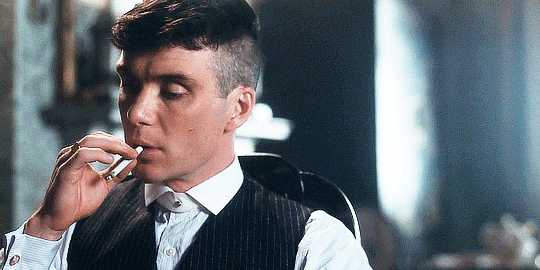
As demonstrated by: Tommy Shelby from Peaky Blinders.
Why he could be a hero: He’s incredibly charismatic, intelligent, and courageous. He deeply cares for his loved ones, has a strict code of honor, reacts violently to the mistreatment of innocents, and demonstrates surprisingly high levels of empathy.
Why he’s an antihero: He also happens to be a ruthless, incredibly violent crime lord who regularly slashes out his enemies’ eyes.
What he can teach us: From the moment Tommy Shelby makes his entrance, it becomes apparent that Peaky Blinders will not unfold like the archetypical crime drama. Evocative of the outlaw mythos of the Old West, Tommy rides across a smoky, industrialized landscape. He is immaculately dressed, bareback, on a magnificent black horse. A rogue element, his presence carries immediate power, causing pedestrians to hurriedly clear a path. You get the sense that he does not conform to this time or era, nor does he abide by the rules of society.

The ONLY acceptable way to introduce a protagonist.
Set in the decades between World War I and II, Peaky Blinders differentiates itself from its peers, not just because of its distinctive, almost Shakespearian style of storytelling, powerful visual style, and use of contemporary music, but also in the manner in which it shows that society provokes the very criminality it attempts to vanquish. Moreover, it dedicates time to demonstrating why this form of criminality is sometimes the only option for success in an unfair system. When the law wants to keep you relegated to the station in which you were born, success almost inevitably means breaking the rules. Tommy is considered one of the most influential characters of the decade because of the manner in which he embodies this phenomenon, and the reason why antiheroes pervade folklore across the decades.
Peaky Blinders engenders a unique level of empathy within its first episodes, in which we are not just immersed in the glamour of the gangster lifestyle, but we understand the background that provoked it. Tommy, who grew up impoverished and discriminated against due to his “didicoy” Romany background, volunteered to fight for his country, and went to war as a highly intelligent, empathetic young man. He returned with the knowledge that the country he had served had essentially used him and others like him as canon fodder, with no regard for their lives, well-being, or future. Such veterans were often looked down upon or disregarded by a society eager to forget the war. Having served as a tunneler – regarded to be the worst possible position in a war already beset by unprecedented brutality – Tommy’s constant proximity to death not only destroyed his faith in authority, but also his fear of mortality. This absence of fear and deference, coupled with his incredible intelligence, ambition, ruthlessness, and strategic abilities, makes him a dangerous weapon, now pointed at the very society that constructed him to begin with.
It is also difficult to critique Tommy’s criminality, when we take into account that society would have completely stifled him if he had abided by its rules. As someone of Romany heritage, he was raised in abject poverty, and never would have been admitted into situations of higher social class. Even at his most powerful, we see the disdain his colleagues have at being obligated to treat him as an equal. In one particularly powerful scene, he begins shoveling horse manure, explaining that, “I’m reminding myself of what I’d be if I wasn’t who I am.” If he hadn’t left behind society’s rules, his brilliant mind would be occupied only with cleaning stables.
However, the necessity of criminality isn’t depicted as positive: it is one of the greatest tragedies of the narrative that society does not naturally reward the most intelligent or gifted, but instead rewards those born into positions of unjust privilege, and those who are willing to break the rules with intelligence and ruthlessness. Each year, the trauma of killing, nearly being killed, and losing loved ones makes Tommy’s PTSD increasingly worse, to the point at which he regularly contemplates suicide. Cillian Murphy has remarked that Tommy gets little enjoyment out of his wealth and power, doing what he does only for his family and “because he can.” Steven Knight cites the philosophy of Francis Bacon as a driving force behind Tommy’s psychology: “Since it’s all so meaningless, we might as well be extraordinary.”

This is further complicated when it becomes apparent that the upper class he’s worked so arduously to join is not only ruthlessly exclusionary, but also more corrupt than he’s ever been. There are no easy answers, no easy to pinpoint sources of societal or personal issues, no easy divisibility of positive and negative. This duality is something embraced by the narrative, and embodied by its protagonist. An intriguingly androgynous figure, Tommy emulated the strength and tenacity of the women in his life, particularly his mother; however, he also internalized her application of violence, even laughing about how she used to beat him with a frying pan. His family is his greatest source of strength and his greatest weakness, often exploited by his enemies who realize they cannot fall back on his fear of mortality. He feels emotions more strongly than the other characters, and ironically must numb himself to the world around him in order to cope with it.
However, all hope is not lost. Creator Steven Knight has stated that his hope is ultimately to redeem Tommy, so by the show’s end he is “a good man doing good things.” There are already whispers of what this may look like: as an MP, Tommy cares for Birmingham and its citizens far more than any “legitimate” politicians, meeting with them personally to ensure their needs are met; as of last season, he attempted a Sinatra-style assassination of a rising fascist simply because it was the right thing to do. “Goodness” is an option in the world of Peaky Blinders; the only question is what form it will take on a landscape plagued by corruption at every turn.
Regardless of what form his “redemption” might take, it’s negligible that Tommy will ever meet all the criteria of an archetypal hero as we understand it today. He is far more evocative of the heroes of Ancient Greece, of the Old West, of the Golden Age of Piracy, of Feudal Japan – ferocious, magnitudinous figures who move and make the earth turn with them, who navigate the ever-changing landscapes of society and refuse to abide by its rules, simultaneously destructive and life-affirming. And that’s what makes him so damn compelling.
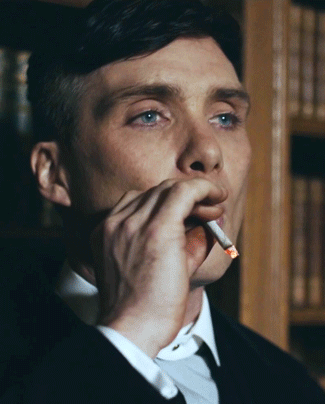
Who needs traditional morality, when you look this damn good?
Other examples:
Alfie Solomons from Peaky Blinders. Tommy’s friend and sometimes mortal enemy, the two develop an intriguing, almost romantic connection due to their shared experiences of oppression and powerful intellects. Steven Knight has referred to Alfie as “the only person Tommy can really talk to,” possibly because he is Tommy’s only intellectual equal, resulting in a strange form of spiritual matrimony between the two.
Omar Little from The Wire, an oftentimes tender and compassionate man who cares deeply for his loved ones, and does his best to promote morality and idealism in a society which offers him few viable methods of doing so. He may rob drug dealers at gunpoint, but he also refuses to harm innocents, dislikes swearing, and views his actions as a method of decreasing crime in the area.
Chiron from Moonlight, a sensitive and empathetic young man who became a drug dealer because society had provided him with virtually no other options for self-sustenance. The same could be said for Chiron’s mentor and father figure, Juan, a kind and nurturing man who is also a drug dealer.
To a lesser extent, Tony from The Sopranos, and other fictional Italian American gangsters. The Sopranos often negotiates the roots of mob culture as a response to inequalities, while also holding its characters accountable for their actions by pointing out that Tony and his ilk are now rich and privileged and face little systematic discrimination.
Walter White from Breaking Bad – an underpaid, chronically disrespected teacher who has to work two jobs and still can’t afford to pay for medical treatment. More on him on the next page.
Antiheroes show us how we can be the villains.
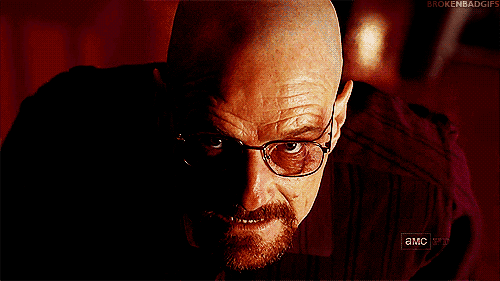
As demonstrated by: Walter White from Breaking Bad.
Why he could be a hero: He’s a brilliant, underappreciated chemist whose work contributed to the winning of a Nobel Prize. He’s also forging his own path in the face of incredible adversity, and attempting to provide for his family in the event of his death.
Why he’s an antihero: In his pre-meth days, Walt failed to meet the exceptionalism associated with heroes, as a moral but socially passive underachiever living an unremarkable life. At the end of his transformation, he is exceptional at what he does, but has completely lost his moral standards.
What he can teach us: G.K. Chesterton wrote, “Fairy tales do not tell children that the dragons exist. Children already know that dragons exist. Fairy tales tell children the dragons can be killed.” Following this analogy, it is equally important that our stories show us we, ourselves, can be the dragon. Or the villain, to be more specific, because being a dragon sounds strangely awesome.
Walter White of Breaking Bad is a paragon of antiheroism for a reason: he subverts almost every traditional aspect of heroism. From the opening shots of Walt careening along in an RV, clad in tighty whities and a gas mask, we recognize that he is neither physically capable, nor competent in the manner we’ve come to expect from our heroes. He is not especially conventionally attractive, nor are women particularly drawn to him. He does not excel at his career or garner respect. As the series progresses, Walt does develop the competence, confidence, courage, and resilience we expect of heroes, but he is no longer the moral protagonist: he is self-motivated, vindictive, and callous. And somehow, he still remains identifiable, which is integral to his efficacy.
But let us return to the beginning of the series, and talk about how, exactly, Walt subverts our expectations from the get-go. Walt is the epitome of an everyman: he’s fifty years old, middle class, passive, and worried about identifiable problems – his health, his bills, his physically disabled son, and his unborn baby. Whereas Tommy Shelby’s angelic looks, courage, and intellect subvert our preconceptions about what a criminal can be, Walt’s initial unremarkability subverts our preconceptions about who can be a criminal. The hook of the series is the idea that a man so chronically average could make and distribute meth.
Just because an audience is hooked by a concept, however, does not mean that they’ll necessarily continue watching. Breaking Bad could have easily veered into ludicrosity, if it weren’t for another important factor: character. Walt is immediately and intensely relatable, and he somehow retains our empathy for the entirety of the series, even at his least forgivable.
When we first meet Walt, his talents are underappreciated, he’s overqualified for his menial jobs, chronically disrespected by everyone around him, underpaid, and trapped in a joyless, passionless life in which the highlight of his day is a halfhearted handjob from his distracted wife. And to top it all off? He has terminal lung cancer. Happy birthday, Walt.
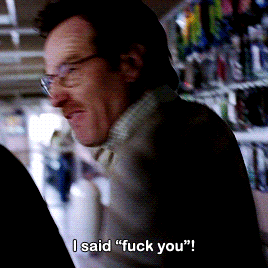
We root for him for the same reason we root for Dumbo, Rudolph, Harry Potter: he’s an underdog. The odds are stacked against him, and we want to see him triumph. Which is why it’s cathartic, for us and for Walt, when he finally finds a profession in which he can excel – even if that profession is the ability to manufacture incredibly high-quality meth. His former student Jesse Pinkman – a character so interesting that there’s a genuine risk he’ll hijack this essay – appreciates his skill, and this early appreciation is what makes his relationship with Jesse feel so much more genuine than Walt’s relationship with his family, even as their dynamic becomes increasingly unhealthy and Walt uses Jesse to bolster his meth business and his ego. This deeply dysfunctional but heartfelt father-son connection is Walt’s tether to humanity as he becomes increasingly inhumane, while also demonstrating his descent from morality. It has been pointed out that one can gauge how far-gone Walt is from his moral ideals by how much Jesse is suffering.
But to return to the initial point, it is imperative that we first empathize with Walt in order to adequately understand his descent. Aside from the fact that almost all characters are more interesting if the audience can or wants to empathize with them, Walt’s relatability makes it easy to understand our own potential for toxic and destructive behaviors. We are the protagonist of our own story, but we aren’t necessarily its hero.
Similarly, we understand how easily we can justify destructive actions, and how quickly reasonable feelings of anger and injustice swerve into self-indulgent vindication and entitlement. Walt claims to be cooking meth to provide for his family, and this may be partially true; but he also denies financial help from his rich friends out of spite, and admits later to his wife Skylar that he primarily did it for himself because he was good at it and “it made (him) feel alive.”
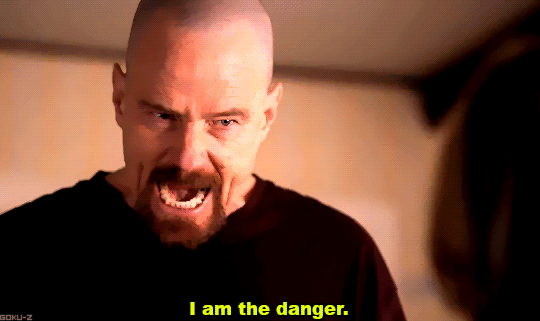
This also forces us to examine our preconceptions, and essentially do Walt’s introspections for him: whereas Peaky Blinders emphasize the fact that Tommy and his family would never have been able to achieve prosperity by obeying society’s laws, Walt feels jilted out of success he was promised by a meritocratic system that doesn’t currently exist. He has essentially achieved our current understanding of the American dream – a house with a pool, a beautiful wife and family, an honest job – but it left him unable to provide for his wife and children or even pay for his cancer treatment. He’s also unhappy and alienated from his passions and fellow human beings. With this in mind, it’s understandable – if absurd – that the only way he can attain genuine happiness and excel is through becoming a meth cook. In this way, Breaking Bad is both a scathing critique of our current society, and a haunting reminder that there’s not as much standing between ourselves and villainy as we might like to believe.
So are we all slaves to this system of entitlement and resentment, of shattered and unfulfilling dreams? No, because Breaking Bad provides us with an intriguing and vital counterpoint: Jesse Pinkman. Whereas Walt was bolstered with promises that he was gifted and had a bright future ahead of him, Jesse was assured by every authority figure in his life that he would never amount to anything. However, Jesse proves himself skilled at what he’s passionate about: art, carpentry, and of course, cooking meth. Whereas Walt perpetually rationalizes and shirks responsibility, Jesse compulsively takes responsibility, even for things that weren’t his fault. Whereas Walt found it increasingly acceptable to endanger or harm bystanders, Jesse continuously worked to protect innocents – especially children – from getting hurt. Though Jesse suffered immensely throughout the course of the show – and the subsequent movie, El Camino – the creators say that he successfully made it to Alaska and started a carpentry business. Some theorists have supposed that Jesse might be a Jesus allegory – a carpenter who suffers for the sins of others. Regardless of whether this is true, it is interesting, and amusing to imagine Jesus using the word “bitch” so often. Though he didn’t get the instant gratification of immediate success that Walt got, he was able to carve (no pun intended – carpentry, you know) a place for himself in the world.
Jesse isn’t a perfect person, but he reminds us that improving ourselves and creating a better life is an option, even if Walt’s rise to power was more initially thrilling. So take heart: there’s a bit of Heisenberg in all of us, but there’s also a bit of Jesse Pinkman.
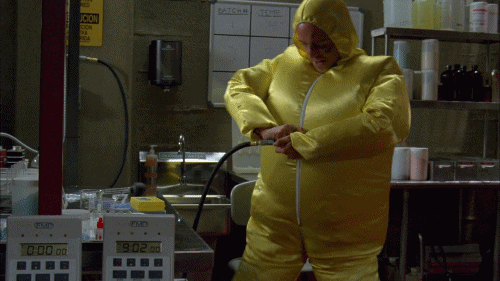
The savior we all need, but don’t deserve.
Other examples:
Bojack from Bojack Horseman. Like Walt, the audience can’t help but empathize with Bojack, understand his decision-making, and even see ourselves in him. However, the narrative ruthlessly demonstrates the consequences of his actions, and shows us how negatively his selfishness and self-destructive qualities impact others.
Again, Tony Soprano. Tony, even at his very worst, is easy to like and empathize with. Despite his position as a mafia Godfather, he’s unfailingly human. Which makes the destruction caused by his actions all the more resonant.
Antiheroes emphasize the absurdity of contemporary culture (and how we must operate in it.)

As demonstrated by: Marty Byrde from Ozark.
Why he could be a hero: He’s a loving father who ultimately just wants to provide for and ensure the safety of his family. He’s also fiercely intelligent, with excellent negotiative, interpersonal, and strategic skills that allows him to talk his way out of almost any situation without the use of violence.
Why he’s an antihero: He launders money for a ruthless drug cartel, and has no issue dipping his toes into various illegal activities.
Why he’s compelling: Marty is an antihero of the modern era. He has a remarkable ability to talk his way into or out of any situation, and he’s also a master of using a pre-constructed system of rules and privileges to his benefit.
In the very first episode, he goes from literally selling the American Dream, to avoiding murder at the hands of a ruthless drug cartel by planning to launder money for them in the titular Ozarks. Despite his long history of dabbling in illegality, Marty has no firearms – a questionable choice for someone on the run from violent drug kingpins, but a testament to his ability to rely on his oratory skills and nothing else. He doesn’t hesitate to engage an apparently violent group of hillbillies to request the return of his stolen cash, because he knows he can talk them into giving it back to him. The only time he engages other characters in physical violence, he immediately gets pummeled, because physical altercation has never been his form of currency. Not that he’s subjected to physical violence particularly often, either: Marty is a master of the corporate landscape, which makes him a master of the criminal landscape. He is brilliant at avoiding the consequences of his actions.

It’s easy to like and admire Marty for his cleverness, for being able to escape from apparently impermeable situations with words as his only weapon. He’s got a reassuring, dad-ly sort of charisma that immediately endears the viewer, and offers respite from the seemingly endless threats coming from every direction. He unquestionably loves his family, including his adulterous wife. As such, it’s easy to forget that Marty is being exploited by the same system that exploits all of us: crony capitalism. The polar opposite of meritocratic capitalism – in which success is based on hard work, ingenuity, and, hence the name, merit – crony capitalism benefits only the conglomerates that plague the global landscape like cancerous warts, siphoning money off of workers and natural capital, keeping them indentured with basic necessities and the idle promise of success.
Marty isn’t benefiting from his hard work in the Ozarks. Everything he makes goes right back to the drug cartel who continuously threatens the life of him and his family. He is rewarded for his efforts with a picturesque house, a boat, and the appearance of success, but he is not allowed to keep the fruits of his labor. Marty may be an expert at navigating the corporate and criminal landscape, but it still exploits him. In this manner, Marty embodies both the American business, the American worker, and a sort of inversion of the American dream.
In this same manner, Marty, the other characters, and even the Ozarks themselves embody the modern dissonance between appearance and reality. Marty’s family looks like something you’d respect to see on a Christmas card from your DILF-y, successful coworker, but it’s bubbling with dysfunctionality. His wife is cheating on him with a much-older man, and instead of confronting her about it, he first hired a private investigator and then spent weeks rewatching the footage, paralyzed with options and debating what to do. The problem somewhat solves itself when his wife’s lover is unceremoniously murdered by the cartel, and Wendy and Marty are driven into a sort of matrimonial business partnership motivated by the shared interest of protecting their children, but this also further demonstrates how corporate even their family dealings have become. His children, though precocious, are forced to contend with age-inappropriate levels of responsibility and the trauma of sudden relocation, juxtaposed with a childhood of complete privilege up until this point.
Conversely, the shadow of the Byrde family is arguably the Langmores. Precocious teenagers Ruth and Wyatt can initially be shrugged off as local hillbillies and budding con-artists, but much like the Shelby family of the Peaky Blinders, they prove to be extremely intelligent individuals suffering beneath a society that doesn’t care about their stifled potential. Systemic poverty is a bushfire that spreads from one generation to the next, stoked by the prejudices of authority figures and abusive parental figures who refuse to embrace change out of a misguided sense of class-loyalty.
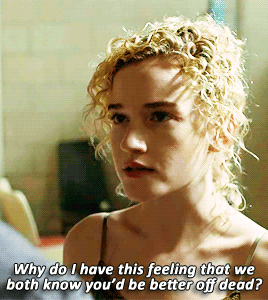
Almost every other character we meet eventually inverts our expectations of them: from the folksy, salt-of-the-earth farmers who grow poppies for opium and murder more remorselessly than the cartel itself, to the cookie-cutter FBI agent whose behavior becomes increasingly volatile and chaotic, to the heroin-filled Bibles handed out by an unknowing preacher, to the secrets hidden by the lake itself, every detail conveys corruption hidden behind a postcard-pretty picture of tranquility and success.
Marty’s awareness of this illusion, and what lurks behind it, is perhaps the greatest subversion of all. Marty knows that the world of appearance and the world of reality coexist, and he was blessed with a natural talent for navigating within the two. Like Walter White, Marty makes us question our assumptions about who a criminal can be – despite the fact that many successful, attractive, middle-aged family men launder money and juggle criminal activities, it’s still jarring to witness, which tells us something about how image informs our understanding of reality. Socially privileged, white-collar criminals simply have more control over how they’re portrayed than an inner-city gang, or impoverished teenagers. However, unlike Walt, Marty’s criminal activities are not any kind of middle-aged catharsis: they’re a way of life, firmly ingrained in the corporate landscape. They were present long before he arrived on the scene, and he knows it. He just has to navigate them.
Just like our shining, messianic heroes can teach us about truth, justice, and the American way, so too does each antihero have something to teach us: they teach us that society doesn’t reward those who follow its instructions, nor does it often provide an avenue of morality. Even if you live a life devoid of apparent sin, every privilege is paid for by someone else’s sacrifice. But the best antiheroes are not beacons of nihilism – they show us the beauty that can emerge from even the ugliest of situations. Peaky Blinders is, at its core, a love story between Tommy Shelby and the family he crawled out of his grave for, just as Breaking Bad is ultimately a deeply dysfunctional tale of a father figure and son. Ozark, like its predecessors, is about family – the only authenticity in a society that operates on deception, illusion, and corruption. They teach us that even in the worst times and situations, love can compel us, redeem us, bind us closer together. Only then can we face the dragons of life, and feel just a bit more heroic.
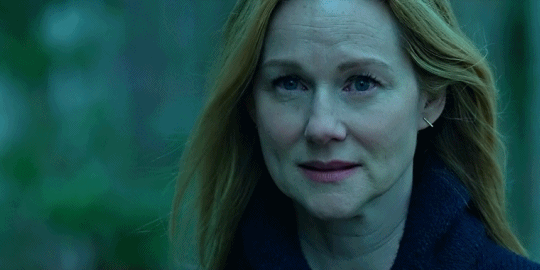
Other examples:
Don Draper from Mad Men. A similarly Shakespearian figure for the modern era, Don is a man who appears to have everything – perfect looks, a beautiful wife and children, a prestigious job. He could have stepped out of an ad for the American Dream. And yet, he feels disconnected from his life, isolated from others by the very societal rules he, as a member of the ad agency, helps to propagate. It helps that he’s literally leading a borrowed life, inherited from the stolen identity of his deceased fellow soldier, and was actually an impoverished, illegitimate farmboy whose childhood abuse permanently damaged his ability to form relationships. The Hopper-esque alienation evoked by the world of Mad Men really deserves an essay all it’s own, and his wife Betty – whose Stepford-level mask of cheerful subservience hides seething unhappiness and unfulfilled potential – is a particularly intriguing figure to explore. Maybe in my next essay, on the importance of the antiheroine.

#my writing tips#writing tips#tommy shelby#peaky blinders#walter white#breaking bad#jesse pinkman#bojack horseman#don draper#writing advice#antihero#the types of antiheroes#long post for ts
985 notes
·
View notes
Text
a deadly education is tone-deaf at best and racist at worse; not the cure to jkr anyone was hoping for
Harry Potter’s massive cultural impact means that we haven’t seen the last of magic schools set in Britain, and we probably won’t for a long while. In some ways, the fantasy genre’s response to Rowling’s work is tiresome. In others, it’s exciting—because a generation of readers and writers have grown up to bring their own perspective to the limits of Rowling’s work and push it beyond the limits of its author. However, if you’re looking for a transgressive magic academy book that interrogates the limited morality, inclusivity, and perspective of Harry Potter, you should put Naomi Novik’s A Deadly Education back on the shelf and keep looking.
A Deadly Education tells the story of Galadriel “El” Higgins, a half-British half-Indian sorcerer attending a magic school where the consequences of any mistake might mean sudden death. El is a loner by nature and circumstance, but walking alone in the halls of Scholomance might mean being attacked and devoured by one of the school’s monsters. This puts El on a crash course with Orion Lake, the shining hero of her year who takes it upon himself to save the lives of his fellow students, including a less-than-grateful El.
The set up honestly sounds pretty good—a prickly protagonist, a heroic rival-slash-love interest, a deadly setting, and the potential for deep lore in magic and world-building. Unfortunately, not only does Novik fail to deliver on any of the premises’ strengths, she also chooses to weigh her narrative down with reductive, tone-deaf, and downright racist details.
El’s particular class of magic relies on language. El speaks English and Marathi, and picks up Sanskrit, Hindi, Latin and Old English in her study of language-based spells. It’s a little uncomfortable that Novik lumps dead and defunct languages like Latin and Old English together with actively spoken ones like Mandarin, Hindi, and Spanish, but that isn’t where Novik’s faux paus end. El approaches languages like computer programs to be downloaded onto her hard drive. Despite languages being the basis of her magic, she has no personal connections to the ones she’s speaking. She views other students and their languages the same way, identifying groups of students as “the Mandarin speakers”, “the Arabic speakers,” etc. Novik seems clueless about the relationships between the languages she’s building her world’s magic around, putting Sanskrit tombs in Baghdad and declaring that the Scholomance has a library aisle containing all of India’s languages. (About 800 individual languages are spoken in India, fyi.)
This clinical approach to diversity extends from language into character. El doesn’t try to make many friends, and honestly it’s not hard to see her classmates don’t try to befriend her, either. She doesn’t describe her classmates as people—she describes them as assets. And while that could be explained away by the premise that half her classmates won’t make it out of school alive, and El needs allies more than friends to survive, it doesn’t make it any better when El refers to others exclusively by the language knowledge they offer her. A character named Ibrahim has no personality or backstory, but he conveniently pops up when El needs someone who knows Arabic. A character named Kaito is thoughtlessly grouped in with the Mandarin speakers. An Argentine character exclaims in Spanish when she’s excited or relieved. There’s an uncomfortable distinction between the languages that get written out in the text—Spanish, French—and the ones that get narrated away—a character exclaims in Mandarin.
Novik goes out of her way to let us know that the population of Scholomance is diverse. There’s a group of South and West African students (only one of whom is named, and none of whom are important). There’s a “civilized” enclave of magicians in Toronto who value family and human life more than other groups. One character might graduate and go to Bangkok, but he’s looking to secure himself a place in Shanghai instead. Naomi Novik really knows the names of cities on at least four continents, and she’s not about to let you forget it!
But aside from names, languages, and cities, Novik has given no thought to what diversity means, or who these characters are if they come from diverse backgrounds. El calls on “Mandarin-speaker,” Yi Liu, exclusively by the name Liu. Is Liu meant to be this character’s first name? Or her surname? El doesn’t call anyone else by surname, but Liu is a Chinese surname, one of the most common in the world. El’s father is a Marathi-speaker from Mumbai, but El has no personal connection to Indian culture. Her father’s family prophesied that El would be a destroyer, and other than that rejection El has nothing to say about India or half of her culture. She refers to her Indian relatives in clinical English descriptors (my father’s mother, my great-grandmother, my uncles), even though she is purportedly fluent in Marathi and should know words like Panaji, Aaji and Kaka. El says that her Indian family is from an old Hindu enclave, and yet they have djinn as servants. (Djinn aren’t a typical part of Hindu cosmology, though they are a significant part of Islamic texts.)
Making El biracial seems like an afterthought, not something that affects her character in any way. It just creates some truly unfortunate optics, like when El goes on a three-paragraph description of how unnecessary she finds showers and how dirty she is at any given time. El’s father died making sure her pregnant mother (and therefore, El herself) would live, and yet El barely thinks about him. His name is mentioned once in the entire book. El complains that (presumably white) British people “assume she speaks Hindi” or call her the color of weak tea. But her Indian heritage is a veneer placed on top of a character who is otherwise just a default white protagonist.
All this adds up to a character (and a world), that reads as nothing so much as colonial. El feasts on the languages of others for her own edification, power, and survival, but she doesn’t see her classmates as people, and she doesn’t see language as a living thing related to real cultures. And I’m given to believe that Naomi Novik holds the same views, what with how she throws around the word “mana” as part of her world-building without considering its roots and real-life meaning to Polynesian and Melanesian peoples.
However, nothing makes the cultural tone-deafness of this book more evident than this passage:
Dreadlocks are unfortunately not a great idea thanks to lockleeches, which you can probably imagine, but in case you need help, the adult spindly thing comes quietly down at night and pokes an ovipositor into any big clumps of hair, lays an egg inside, and creeps away. A little while later the leech hatches inside its comfy nest, attaches itself to your scalp almost unnoticeably, and starts very gently sucking up your blood and mana while infiltrating further. If you don’t get it out within a week or two, it usually manages to work its way inside the skull, and you’ve got a window of a few days after that before you stop being able to move. On the bright side, something else usually finishes you off quickly at that point.
El’s pithy commentary about imminent death aside, I have a hard time reading anything but casual and thoughtless racism from this passage. The nefarious and deliberate myth of dreadlocks being unhygienic (and by extension, Black people being endemically dirty) is pervasive to this day. And Naomi Novik decides to include this passage in a book that has no major Black characters, in which dreadlocks never even come up in any meaningful way, just to remind us that in this magic world of hers, dreadlocks are dirty! Monster insects nest in them! The consequences are death! There was no good reason to include this passage, and all it does is draw on inaccurate and racist myths and perpetuate them into a world where anti-Black racism is never contended with. Although, I suppose, why would it? El never has need of any languages from the West or South Africans.
A Deadly Education bills itself as a subversive, even feminist, response to Harry Potter. But just like J. K. Rowling, Naomi Novik is a white author who uses other cultures thoughtlessly to build her own magic world. Other cultures and peoples exist, but only to serve the aims and needs of white (or mostly white-coded) characters. Novik has no empathy, no care and apparently no ability to Google anything about the cultures she wants to draw on. And the result isn’t just insulting—it’s boring. The world-building in this book is as dry and dusty as any history written by 19th century British colonizers.
Using some foreign names and making your protagonist biracial does not shield your work from racism. It does open you up to more pitfalls in depicting other peoples and cultures, if you don’t care to look out for them.
It would be nice to close by saying that despite its flaws, A Deadly Education is an enjoyable book. But it isn’t. It’s just a badly-researched, emotionless story told by rote.
195 notes
·
View notes
Text
Uncle Scrooge by Don Rosa: The Isle at the Edge of Time (Thank You Comission For Rosie Isla)
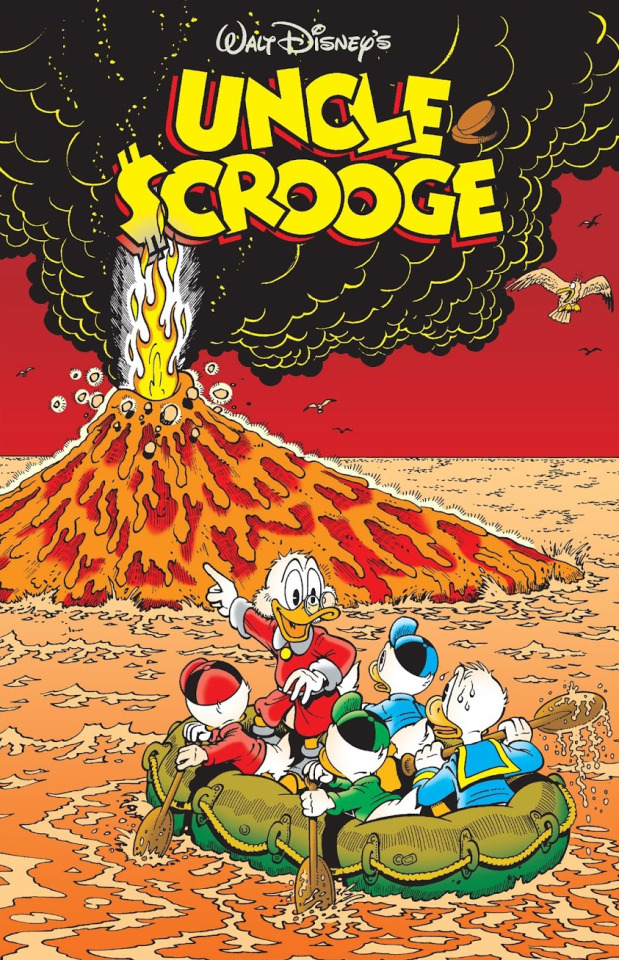
Hello all you happy people! Today’s review is a bit special as it’s the result of another review. See I had trouble finding a translation of the subject of last weeks’ mother’s day special, Family Ties.
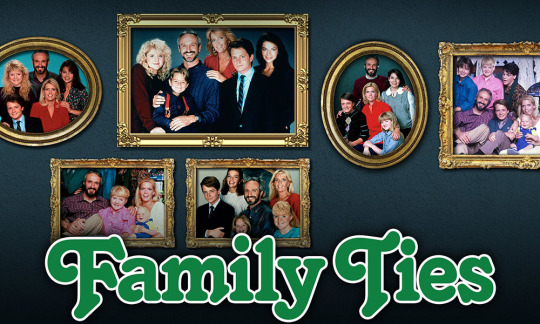
No not that one. I have Paramount+. I can watch all the Family Ties I want and that’s a fact that i’m pleased as punch about.
No it was the story 80 is Prachtig, called Family Ties in the copy used, Della’s first major comics appearance and one that explains what happened to her in the classic continuity, one that clearly served as the foundation for her far more fleshed out 2017 versions personality and backstory. It also had Pinocchio in it for some reason, and spent most of it’s large run time on a meta comedy plot that had nothing to do with the reason anyone wanted to read this story in the first place.
But despite being a vitally important story, it never got an english translation, something that baffled me till I read the story and found cameos of the racist indigenous stereotypes from Peter Pan. In 2014. You may commence booing. Even with how weird the story was I simply couldn’t find the story googling it and the Della tag is too vast and deep to go spelunking in.
So what’s all this have to do? Simple I put out a post last month when neither I nor Kev, who wanted to comission it as part of Moons, Millionares and Mothers, my coverage of all three season 2 Ducktales story arcs, could find a copy and offered a review to whoever found it. Weeks passed I got nothing.. then in the 11th hour I got a break as the lovely @rosieisla found a translation that was on this very site, one she seemed to have helped with. As a result I could do the review and as a man of my word, offered it up despite her clearly having not seen that part of the post and simply having done this to be nice. Still she gladly took up the offer and offered me my pick of two stories: The Carl Barks Story Back to Long Ago or this one.
As for WHY I picked this one Back To Long Ago didn’t seem bad, i’m just not a fan of “The Cast is put in the past as their own ancestors” type deals. Or in some cases put the cast as people from that time period. It’s just not for me and is most often done in TV where it can get really goofy, Beverly Hills 90210 being a prime example of this, though Girl Meets World was no slouch in being embarassing... that being said I really need to finish that show and miss it.
So yeah when put up against a story with two intresting hooks and FLINTHEART GLOMGOLD, even if i’ts not the version that’s my boy, it was no contest. So what are these hooks you ask? Well join me under the cut and find out.

We open with a weird stylistic choice: This story has a narrator complete with caption boxes. Now for those of you familiar with comics or pastiches of comics in tv and film, this probably dosen’t seem like a big deal. It was a common thing in comics from their inception to 90′s to have caption boxes, big boxes of text narrating the action to help move things along faster. It did start to fade out by the 80′s and was gone by the end of the 90′s for the most part, replaced instead with first person narration. It’s the kind of thing you’d see most often in the Golden and Silver Ages, with stuff like tihs

It’s not a BAD device, it’s good old cheesy and bombastic fun and some writers did get clever with it.. like that time Chris Claremont used the narration to yell at a greiving cyclops after he lost a teammate early in his long and storied run on the uncanny x-men.

This is a objectively weird scene that’s still somehow effective by the by. On the one hand it does come off as Chris Claremont essentally bullying Cyclops who already feels guilty for a death that was not in fact his fault as Thunderbird was told the plane he was attacking with fleeing villian Count Nefaria was about to explode and refused to listen.. and that they needed to get rid of either him or Wolverine as both served the same purpose and chose the non-white guy.
On the other htough it comes off just as much as Scott beating himself up in his grief and anger over the event and his perceived failings as a leader. It’s good stuff and shows why this run caught on as this was only three issues in. Also the rest of the issue features the X-Men fighting a giant cyclopian demon that Cyclops accidently freed in his rage by destroying the stone thing keeping him imprisoned. No really here’s the cover
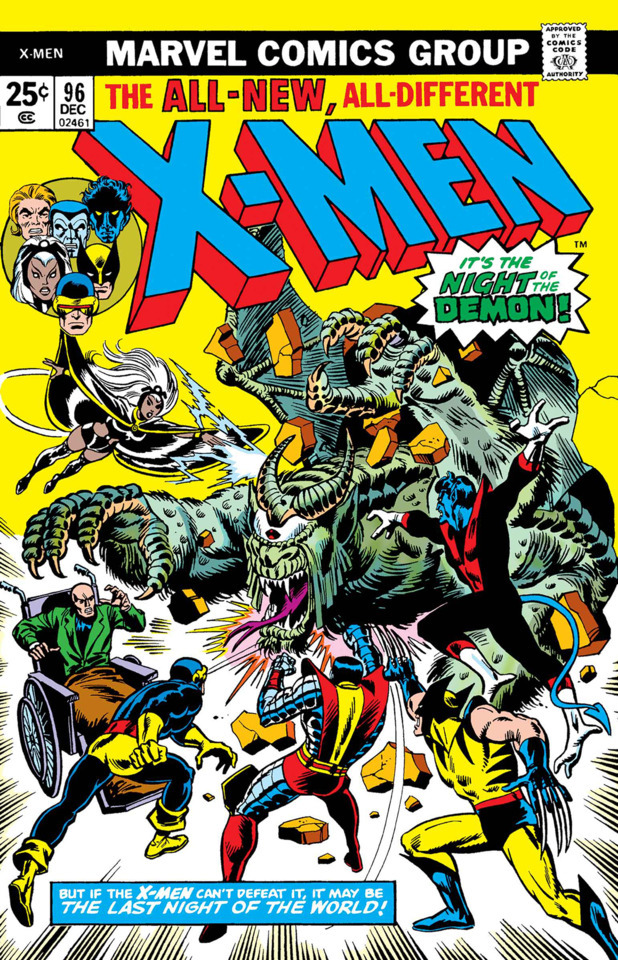
Huh so tha’ts what Nifty’s dad looks like. Neat. Also I REALLY hope we get the X-Men fighting aliens or demons in the MCU. Unlike the XCU the MCU isn’t alergic to getting batshit.. and for the record Deadpool and New Mutants are the exception, not the rule.
My point that I swear I do have is that this was common practice for most comics.. but never really for Disney Duck comics. It popped up ocasionally, like with Scrooge’s introduction, but Barks and those after him never really used them that much. Sure they’d have caption boxes for flasbacks and what not but Barks and Co geninely only used this sort of thing to set up a story. The most i’ve seen it in a duck comic is life and times and even then i’ts usually only used for gags or to set up the passage of time, as the story IS covering decades and thus often needed to have montages to show time passing, and in the case of chapter 11, had to cover decades in the span of a single chapter, so it’s not like they had many other options. So even Rosa as a personal quirk didn’t really use these often.
Rosa used this specifically because he felt the plot was complicated by the use of the international date line. As for what it is, it’s essentially a line marking calender dates from one side of the hemisphere to the others. To use the offical defentition from the National Ocean Service I found via a quick google:
“The International Date Line, established in 1884, passes through the mid-Pacific Ocean and roughly follows a 180 degrees longitude north-south line on the Earth. It is located halfway round the world from the prime meridian—the zero degrees longitude established in Greenwich, England, in 1852.
The International Date Line functions as a “line of demarcation” separating two consecutive calendar dates. When you cross the date line, you become a time traveler of sorts! Cross to the west and it’s one day later; cross back and you’ve “gone back in time."
Despite its name, the International Date Line has no legal international status and countries are free to choose the dates that they observe. While the date line generally runs north to south from pole to pole, it zigzags around political borders such as eastern Russia and Alaska’s Aleutian Islands.”
Rosa felt this made the story complicated.... and that... really isn’t remotely true. The narration is mostly used for gagas and really dosen’t clarify anything. it’s mostly used well in the opening.. but the actual explinations for the date line are clear enough in the story that even if I hadn’t looked the thing up, I still would’ve got it and i’m sure a kid would’ve too. It just feels like a weird thing to ruminate on, especially because he’s got actual things to make up for: while to his credit the native american characters he cribbed from carl barks are sympathetic, their culture respected and treated decently and used for a green aseop, their dialouge is stitled and sterotypical something he dosen’t even comment on (And these trades ewren’t THAT long ago)
And of course it dosen’t help that he dosen’t even comment on using a common device in american superhero boooks.. in the same volume where he ONCE again makes an unwanted and outdated diatribe about superhero comics. I’ll probably cover the Super Snooper Strikes again so I can throughly tear this apart but higlights include: Calling superhero comics “Unwanted” just because he dosen’t like them personally, when people like me would disagree and they’ve lasted through a LOT of highs and lows, outdately saying they took over the American market as the only suitable comics which while true for a TIME,but by 2015 when this book was printed is laughably out of date, as non superhero works like The Walking Dead, Saga, and Scott Pilgrim were massively popular, one of my faviorite comics that is entirely slice of life and would go on to bea huge hit, Giant Days, re-debuted that very year. He also has the fucking gal to insult The Uncanny X-Men by name and I swear to god I did not know this when I made those references earlier, but as you probably guessed REALLY god me livid.
And this is just on his COMMENTS on the story I can’t imagine just how bad the content itself is and having read the first few pages which come off as Rosa using Donald to essentially do an “old man yells at cloud rant” about superhero comics, I really don’t want to. Might make htis a patreon exclusive or again would do it on comissoin. You all make the call.... the point is I don’t likes his elitist bullshit about superhero comics, and this is clearly something that gets my hackles up as I just spent a good two paragraphs of an entirely unrealted review yelling at the guy for it. I don’t like when he does this and this authors notes entirley felt like an excuse. I GET the dark age of comics were bad, they REALLY were that bad, but I will NEVER accept painting an enitre genre as bad just because one work in it is bad. And I wont accept it from someone who himself writes about an often throughly unlikeable anti-hero for a living. Scrooge may not have a gun on his gun on his gun or get to stabbing or have pouches, but he DOES finacially abuse his nephew, scoff at people’s personal troubles, and often refuse to use his wealth to help others in general. So yeah in conclusion Rosa really needs to say less about this subject.

Okay so where were we.. right the story hadn’t even started yet. Jesus.
Okay so our story begins with the narrator. Whose going on about time and what not. The main point of this speech about time is that it’s night in Duckburg and Scrooge is going to bed as, even being the workhorse that he is, he can’t keep going 24 hours. While he’s snoozing though something major happens and it’s the hook that made me pick this story along with the international dateline one.. an island rises thanks to volcanic erruption.. and the lava is GOLD. That’s just pure unabashed classic Duck Stuff: a mysterious treasure or phenominon of gold bound to bring scrooge in.
But Scrooge isn’t stupid: the sun comes up and the world still spins while he sleeps, so he set up a satalite to monitor for this sort of thing. The thing naturally goes nuts.. and even more naturally breaks down becasue Scrooge bought cheap parts. A nice gag and a fully in character way to bring our antagonist into the picture, as the Satellite of Loaded falls in the middle of South Africa... right on the property of my boy Flintheart Glomgold.
This is something Rosa brought up in his commentary for the story i’d never thought about. It turns out Glomgold being a citzen of Duckburg WASN’T an invention of the original Ducktales but the comics: some overseas had understandably moved him from his home country of South Africa. Him bieing in the same town as Scrooge instead of half a world away allows for easier setups and more intresting ones.
Rosa however being obdient to Barks Version of things, ketp Glomgold in South Africa like barks did, which was an .. ifffy decision given Apartheid had JUST ended at the time of this story. Not so much in the reboot as not only had apartheid been long gone by the time of the reboot, but that’s more fair. Still we do get some gorgeous vistas as a result as Glomgold’s minon goes to look at it and finds it’s from McDuck Mining company... Glomgold’s reaction is obvious.
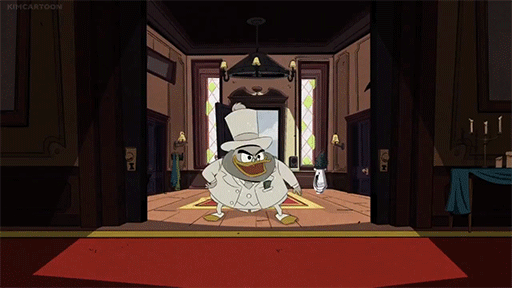
So on that note we cut to Scrooge rushing to Donalds house and forcing him awake and not telling him anything at first. Look his Ducktales Counterpart straight up kidnapped his donald in my last review, I’d call this a win. He also tries to dress Donald while explaning both his panic to find the crashed satlitle and what it found: the golden island. The end result of him dressing donald is worth a chuckle
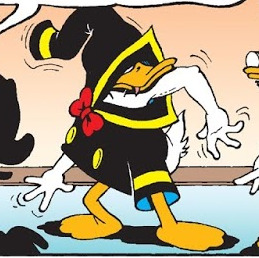
So after Donald puts his shirt and little hat on our heroes get rollin rollin rollin what keep rollin rollin rollin who to Manilla. On the plane we get the scene I mentioned: The boys make a quip about Scrooge having lost a day and the group go over the international date line. It’s a fun little scene especially Donald trying to get paid early at the end. Classic scrooge and donald stuff without the abusive undertones some of their classic stuff has.
Meanwhile Glomgold works out the data and finds out about the gold island, and his excitement accidently wakes a giraffe outside.. welll it was nice knowing him, Giraffes are the deadliest species known to man.. here’s an educational video t back that up....
youtube
So at Manilla Airport, Scrooge finds out abotu the south african crash, figuring he’ll get a laugh out of glomgold being there ... only for Donald to spot the Jet. Scrooge figures this can’t be anything good... now come on man maybe he’s just promoting his energy drink.

As super sayin god super sayian as my witness, I will never get tired of Ultra Instinct Glomgold here.
Scrooge isn’t so nice about that though and figures he better find out if Glomgold knows about the island and bribes one of the fueling crew for his uniform. He sucesssfully eavesdrops on Glomgold talking to his pilot, finding out from him exactly WHERE the island is. He ends up hilariously botching the mission though: when getting ready to leave Glomgold complains abotu the price of gas and that naturally causes Scrooge, just as cheap, to join in... and Glomgold to find out it’s Scrooge. The two wrestle outside the plane but before this can progress to a game of Naked Robber an airport security guy comes up and Scrooge cleverly claims that Glomgold’s plane has an infestiation, requring it to be quanrantined and allowing Scrooge to jet on.. thoguh not with an actual jet. With Glomgold seemingly dispatched, he can afford to save some money and take his time with a seaplane and I know just the man for the job.
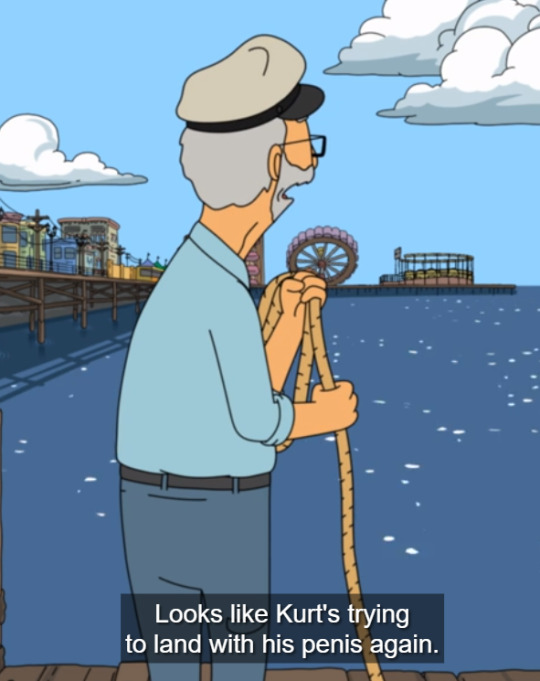
Oh nope looks like he’s busy. So one time related rambles later we meet Keoki, their asian pilot from the tiny island of Wookawooka.. and no that’s not a real place i checked... and no Fozzy dosen’t own it his check bounced. That being said it is a very well done represntation of someone from a smaller country: he’s doing this job to try and bring money back home, but being a seaplane captain just isn’t enough and his island is dying. Scrooge naturally is about as sympathetic as you’d expect, having apparently never even heard of the idea of a bonus when Huey, Dewey or Louie suggests it.
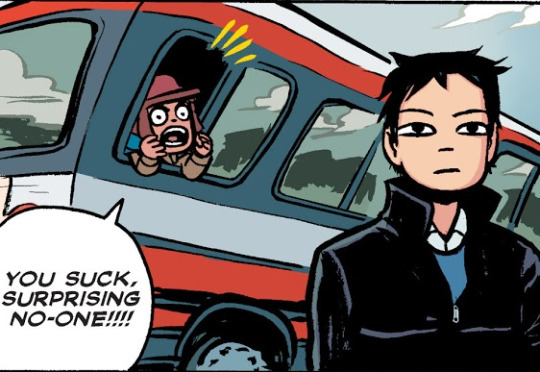
Even less suprising is that Glomgold streaks by in his Jet:turns out Manilla was already overun with the bugs Scrooge claimed and Donald rubs it in that had Scrooge got a JET this wouldn’t of been an issue.
So Glomgold easily beats them there, and to add insult and actualy injury to a cash based one, our heroes get blasted by golden lava on the way in and crash. Should’ve gotten launchpad... got the crashing professional. Keoki is dispondent as this means his people are doomed. He also dosen’t know waht staking a claim is when Scrooge mentions it and the boys bring him up to speed with the poor guy saying he wish he could for WookaWooka. Donald also makes a valid point about how greedy and heartlress scrooge can be.. and really billiionares in general.
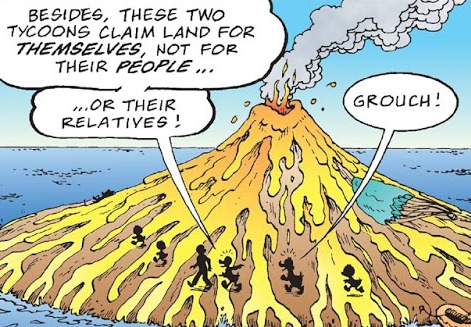
No no YOUR the Grouch who refuses to have one drop of emapthy. Donald’s just pissed at your general selfish and terrible behavior.
Glomgold glomgloats and has seemingly won... but naturally that rant that seemed extranious at the time about the date line comes into play: turns out the Island is on it, and since glomgold put his marker int he west, Scrooge simply puts his in the east which is a whole day before. Now GRANTED there’s nor eal legal prescendice for the intetaoinal date line itself , as noted above... but there’s enough witnesses in Scrooge’s favor that it simply does not matter anyway. Scrooge SEEMINGLY wins.
But Huey, Dewey Or Louie instead backs another claim: Keoki’s from earlier. While it was made in gest, he and the others along with Donald back it as witnsses instad. WookaWooka is saved and SCrogoe ends the story yelling at the narrator.
Final Thoughts: Don Rosa.. did not like this story, feeling it wasn’t one of his best and apologizing for it. I however.. really loved it. It’s not PERFECT: the narration feels not entirely necessary and the gag isn’t as funny as he thinks, though the payoff of scrooge saying “it’s time for this story to end” is fucking hilarous. I also feel it’s a bit too compressed: the story is only 16 pages and was only THAT long because Rosa added a few for exposition, a worthy addition. This feels like one of his 30 page adventure stories but slightly crammed into half the length. I also feel the golden island bit was BADLY underused as it’s such a cool setting but barely shows up in the story.
But despite that.. it’s still a fun story: as is standard for Rosa the art is gorgeous and the humor is great. And unlike some stories where Rosa casually ignores how terrible scrooge is, here it’s his own greed and hubris that do him in: had he actually agreed to help Keoki, the boys likey would’ve let him keep the island but his own cold refusual to be a human being does him in, just as his cheapness nearly did. Flintheart is also decent here.. not the deepest foe but frankly most classical duck antagonists really aren’t all that fleshed out, and we still get some good bits with him. The dateline bit, while telegraphing that it will be important, as I said REALLY isn’t that hard to understand. All in all while i’ll agree with Rosa this isn’t his BEST, it’s still a really damn good story and one he shoudln’t be ashamed of.
Tommorow: Green Eggs and ham is back for some train shenanigans! Kay.
Saturday: The Tom Retrospective returns for it’s last detour! Eclipsa and Moon team up to stop meteora but grapple with diffrent wants: One to save her daughter.. the other to stop waht she clearly sees as an out of control monster. The result.. will only lead to tragedy and a hell of a two parter.
If you liked this review consider joining my patreon, patroen.com/popculturebuffet. At as low as 2 bucks a month you get accesss to my patreon discord, exclusive reviews, and to pick a short when I do one of my shortstragavanzas, a marthon of theatrical shorts honoring a characters birthday. And given Donald’s is next month, now’s the time to get on board.
But if you go up to 5 you get a guaranteed review of whatever you want every month, and will get me to my next milestone, which will give everyone including yourself a monthly public darkwing duck review, reviews of the two Ducktales minis’ I haven’t covered (Time is Money and SuperDuckTales) and a reivew of the Danny Phantom film the Ultimate Enemy. So please join today and if you cannot, like this review, subscribe and give me your opinions on it bellow. Or even if you can feedback is always appricated and I will see you at the next rainbow.
#donald duck#scrooge mcduck#don rosa#ducktales#huey duck#louie duck#dewey duck#flintheart glomgold#gold#island#volcaones
21 notes
·
View notes
Text
Slave to the Quill: Salem, Authorship, Control, and the Fallacy of Happy Endings
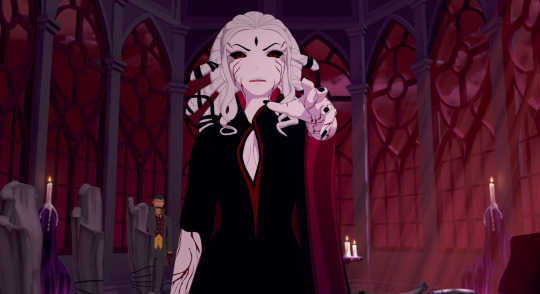
This post is part one in a four part series on Ozma and Salem called Greater Scale Forces, so expect more from me on the subject in the weeks to come. WARNING - in addition to RWBY, there are small references for the following series: Crazy Ex-Girlfriend, Bojack Horseman, and Community.
Once upon a time there stood a lonely tower that sheltered a lonely girl named Salem. She was freed by the legendary hero Ozma, who succeeded where warriors before him had failed. Salem wasn’t just rescued by the Ozma by chance. As Fairy Tales of Remnant reveals, Salem wrote her way out of her prison through story and narrative inspired by the fairy tales she had read in her adolescence. She tossed fliers out her window with her story and plight etched in ink to gain a hero’s sympathy. In this way, Salem not only asserted her agency but set up expectations for herself that motivated her grasp for control, inadvertently caused an apocalypse, and more importantly placed “story” and “myth” at the center of Remnant’s development as a fictional setting.
Salem was reared off fairy tales, a result of being trapped in her tower for her formative years. Her socialization was limited to inconsistent visits from her emotionally distant father and her kindly nanny, with no playmates her age. Fairy Tales of Remnant pulls no punches in elaborating on how this affected Salem’s aspirations for life. To quote: “[Salem] lived hundreds of lives through other people’s stories, and [dreamed] of venturing beyond the tower one day, finding true love, and becoming a kind and generous queen with her own castle and daughters” (106). Salem’s dream is a textbook fairytale happy endings, and she wants her life to play out just like the stories she’s read. When her dreams are confirmed in her rescue by Ozma, is it any surprise that his death shattered her in such a way to defy gods? Not only was Ozma her only living emotional connection due to her upbringing, but her rescue had all but confirmed that she deserved a happy ending, that she played a role in which freedom and true love were deserved as per story structure and narrative.
Salem’s actions all arguably move to appeal to fairy tale narrative archetypes in some way. In “The Girl in the Tower” she plays the damsel in distress, nudging her narrative onwards with her fliers but waiting patiently until the day she is rescued. When dealing with the gods, she at first plays the humble acolyte, praising both brothers to get what she wants as one would in a myth. When they curse her instead of raising Ozma, she picks up a different mantle of righteous leader and inspirer. Then after the earth’s destruction she becomes a wanderer, then a witch, and then a goddess. While she vies for freedom, a goal nurtured from her initial entrapment, it is ironic that Salem in some ways traps herself in the confines of the story itself, allowing story structure to trap her into roles that dissuade her from personal growth unique and separate from media archetypes.
In addition to being motivated by fairy tales and trapped in its narrative, Salem also uses narrative and media as a weapon in RWBY. This is addressed in Ozpin’s end notes of “The Girl in the Tower” in Fairy Tales of Remnant when he points out that Salem’s use of fliers to free herself from her tower as a technical form of “propaganda.” While used for a generally tame purpose in this case, Salem’s approach to media and fairy tale as a form of control, as a form of propaganda, only appears to evolve as her experience continues. Her method of influencing fellow humans to rise up against the gods is by storytelling. As we can recall from “The Lost Fable,” Salem lied and weaved a tale in which she stole immortality from the gods to convince other humans against the Brothers Grimm. As a goddess-queen with Ozma 2.0, it is likely she also acted through fairy tale narrative as well. She has statues built up of her and her husband. She depicts them as hero-ruler-gods. During the Fall of Beacon, she has Cinder hijack and take down Remnant’s communications’ systems so the media and narrative is controlled by her agenda. While Salem is ultimately harmed from her reliance on story and narrative, it is interesting that she also finds agency through authorship and through embarrassing narrative (albeit in a toxic way).
Salem’s personal entanglement with the structure of fairy tales is arguably further represented through the use of Remnant as RWBY’s setting. Remnant is a literal reflection of fairy tales with an added dose of realism. While its characters and culture call back to ancient tales, they live more mundane, less magical lives than those we know from the Grimm fairy tales. Being a hero is an occupation. Magic is commodified and sold as dust. In this way, Remnant reflects Salem’s dilemma well. Remnant forces her to further confront a world with wonder that lacks a “fair” narrative with a happy ending. I don’t know what came first, Salem’s backstory or Remnant’s concept as a fairy tale call back itself (likely Remnant?). However, I will make the point that Salem’s backstory fits well into the world of RWBY through her interaction with the medium of fairy tales. I commend CRWBY on this achievement.
I make note that the pattern of a character’s engrossment in story narrative is a recurring flaw in figures in serialized television. I can think of a few examples of this. Rebecca Bunch from Crazy Ex-Girlfriend, for example, is an anti-hero influenced by musical convention and genre, drawing her expectations for romantic relationships from pop culture: musicals, boy-bands, and rom-coms. Her delusion with cultural media is shown through the show's musical numbers, meant to play out in Rebecca’s head. Bojack from Bojack Horseman similarly engages with celebrity, film, and Hollywood culture in a similar way, engaging with the media as a literal actor while coincidentally obsessing over celebrity as a child through his obsession with race-horse Secretariat. Abed Nadir from Community also bases his social interactions on the US pop culture he absorbed as a child. I think it’s interesting that all these characters who take their cues from the media of their childhood also had traumatic and abusive upbringings (I won’t spoil though). In this way, media takes adjacent blame with these characters’ guardians for misbehavior, ranging from awkward to harmful to world-ending. How these characters evolve through these shows and their changing relationship with the media they rely on provide meta commentary on our individual relationship with culture and story. Rebecca Bunch learns to use pop music as a way to counter romantic expectations for women rather than embrace them as pop music is usually used, a positive message about our relationship with story and media. Bojack’s ending is left ambiguous, but Hollywood’s sway on him is definitely a toxic presence, leading us to believe we should consider rejecting this institution. Abed learns to combine his pop culture obsession with real relationships and become appreciated as a person and better interact with others (also a more hopeful message about media and story).
Like all these character’s before, what does Salem’s story tell us? What will it tell us as more seasons of RWBY come out? Certainly, RWBY doesn’t have a toxic view of fairy tales. Our principal protagonists are positively inspired by them. Ruby wants to be a hero like in all the stories she’s read. Ozpin collects a book of stories from multiple locations from multiple stories. I think where we see the difference is how our protagonists interact with fairytales and how our antagonists (or specifically those under Salem’s mentality) do. Ruby, Ozpin, and our heroes follow fairy tales as a moral standard. The aspire to have good triumph and act to a higher standard through effort and sacrifice. Salem uses fairy tales as a form of wish-fulfilment and totalitarian control. I think the inherent message of RWBY is that we need to respect the lessons learned through story but abandon the structure and endings stories give us. Act like a hero, but live a real life. And, at the same time, be wary of the narratives that surround you. Don’t just copy a narrative, understand the narratives produced and adhere to the best and wisest ones. Think through a text, don’t just take it at face value. That’s the lesson we should learn from Salem’s mistakes.
Let me know your thoughts and if you think I missed anything. Expect Part 2 - The Circle: Oz, Identity, Myth, and The Hero’s Journey, within a week.
73 notes
·
View notes
Photo
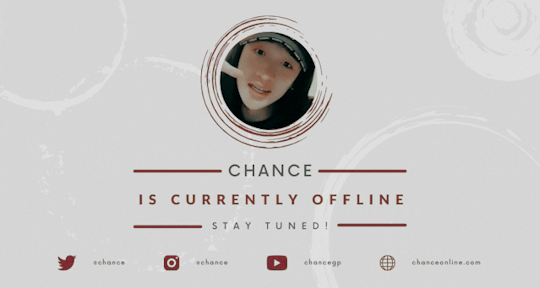
guess the TWENTY FOUR YEAR OLD OCTOBER baby just arrived to dallyeog! it makes sense, because HWA YOHAN / CHANCE HWA is just as CRISP as the month of OCTOBER. wait, why do they remind me of BANG CHAN? beyond that, they seemed RELIABLE AND PASSIONATE upon first glance. i heard someone say they’re sort of SELF-CONSCIOUS AND CAUTIOUS though. i hope they get acquainted here in COMPLEX # 4 / APARTMENT # 1 / FLOOR # 2 ; HE seem(s) to have a lot going on with HIS job as STREAMER.
hi! i’m lu and i’m really happy to present to you to my mess of a son. he’s certainly a hard pill to swallow but he’s not as bad once you get to interact with him. chance is his real english name, but also the persona he’s crafted to remain popular and relevant to the masses. he’s blunt and brutally honest, but mostly when he’s streaming. all in all: a whole ass mess, i insist.
without further ado, here are his basic stats, a trivia and wanted connections under the cut. however you can find his background and plots linked accordingly ( i’ll add other pages eventually ). i’m really fine with talking either here or discord, so whichever works fine for you, works fine for me too! i’ll be reaching to everyone go gives this a like soon enough <3
basic information
― full name: hwa yohan / chance hwa ― nicknames: yohwa ― age: twenty four ― date of birth: october 3rd, 1996 ― birthplace: cheonan, south korea. ― hometown: sydney, australia ― current location: seoul, south korea ― living arrangements: dallyeog / complex # 4 / apartment # 1 / floor # 2 ― ethnicity: korean ― nationality: dual, korean (natural born) and australian (naturalized) ― gender: cis male ― pronouns: he / him ― orientation: demiromantic, heterosexual. ― religion: atheist ― occupation: streamer ― language(s) spoken: korean (fluent), english (fluent) ― accent: heavy australian accent
physical appearance
― faceclaim: bang chan / christopher bang of stray kids. ― hair: naturally brown, though he often dyes to a variety of colors, mostly black and blue. right now, it’s a purple color that’s already fading. ― eye colour: coffee brown ― height: 171cm ― weight: 56kg ― tattoos: none at the moment. ― piercings: lobe and upper lobe on both ears. anti-tragus, orbital and rook on the left one. double helix on the right one. ― clothing style: regularly techwear when he goes out and athleisure at home.
personality
― label: the cynical ― positive traits: attentive, dependable, reliable, passionate, brave, energetic, honest, humorous, clever, versatile, truthful, affectionate, sociable ― negative traits: self-conscious, cautious, opinionated, arrogant, detached, critical, tactless, stubborn, loud, quick-tempered, harsh, unfiltered, cynical, restless, ambitious, ― hobbies: baking, collecting enamel pins and funkos, jigsaw puzzles, skateboarding, reading, listening to music, curating playlists when he has time, learning origami. ― habits: obsessively organising, borrowing books and rarely ever returning them (he forgets who they belong to ok), really bad road rage, awful at keeping track of time, people watching, always wears a black ring on his left index finger, always hugs something when sleeping, gets easily impressed by things, quotes movies and shows in regular conversations, knuckle cracking, snacking between meals, eye rolling without noticing, squinting when concentrated, crossing his arms over his chest, running hands through his hair, slouching, rolling his shoulders. ― zodiac sign: sun libra, moon gemini, ascendant libra. ― mbti: infp-t “the mediator” ― enneagram: 8w7 “the nonconformist”. ― temperament: melancholic ― hogwarts house: ravenclaw ― moral alignment: chaotic neutral ― primary vice: greed ― primary virtue: diligence ― element: air
trivia:
― he’s played all kind of games and his twitch channel was created 9 years ago (whew) and it currently has over 5 million subscribers. currently, he streams mostly genshin impact, valorant, league of legends, overwatch, spider-man: miles morales, cyberpunk 2077 and the witcher iii. every now and then he makes charity streams. he also makes special lives with other gamers and figures where they play games like among us, minecraft, fortnite (though he absolutely hates it), party animals, fall guys and other party games. ― despite the rumours around him and his parents, he’s never talked about them to the media. it’s not like chance hides the information, after all it’s online, but he swerves questions about them and pretty much decides to not say anything about them just to avoid controversy. his parents didn’t mind until last year the company they worked at offered him a sponsorship and yohan turned it down. it’s safe to say they were pretty hurt over this and they haven’t talked much recently. ― yohan is, in his words, the biggest fan of spiderman (not really) but he’s his favorite heroe of all times and he collects everything and anything that has him in it. his biggest collection is funko pops with over 30+ figurines. he collects funkos of various other interests of him as well as enamel pins. ― lowkey a weeb. he likes watching anime in his spare time and if he likes it too much, he’d buy the manga and read it as well. his latest obsessions are kimetsu no yaiba, boku no hero academia, haikyu and jujutsu kaisen. ― won’t ever admit this out loud, but almost every ghibli movie makes him cry his eyes out, even when he’s watched the same one over and over again. he prefers to watch these on his own. his favorite one is grave of the fireflies. ― it took him a while to get used to korean culture, a part of him is still trying to. luckily, his family would speak in korean in their household most of the time and this helped him not struggle as much when it came to the language. his streams are most of the time in english to cater to a bigger audience, but recently he’s got himself a small team of an editor and a translator that’s helped him add subtitles to the videos he uploads in youtube. ― his current setup is completely sponsored except for a few extra things he’s bought himself and he has minimal experience when it comes to builds, though he’s really interested in learning and has recently researched more about the whole topic, hoping to get his first custom build by the end of the year. ― has terrible road rage and this is the reason why he doesn’t own a car or a driving license, even being in the backseat makes him anxious and would much rather prefer to use the bus, a bike or his skateboard to commute between places. taxis and other rides are his last option, if he’s quite honest. ― as a neighbour, he’s polite and tries to be mindful just to avoid needless problems. the first thing he did was soundproof his office in order to not disrupt others, but sometimes this doesn’t work as well due to how loud he can be. chance will try to greet every neighbour he encounters either with a wave or a simple nod. ― loves dogs but doesn’t feel he’s responsible enough to take care of one yet, though he will certainly volunteer to pet-sit his friends’ dogs.
wanted connections:
― life in seoul: he’s been wanting to start a podcast that has nothing to do with his main channel, aka a podcast about the culture in seoul from different perspectives, he wants to know about other people’s experiences. can be people that have lived all their life here or foreigners that, like himself, are pretty much new or can’t get enough of the city. it’d be a pretty chill podcast and anyone can participate! ― people that know about him and lowkey follow his streams (or just play them in the background while doing other stuff) ― or people that know about him but dislike him because he’s said stuff before about other public figures you’re a fan of. or he just simply rubs you the wrong way. ― people who absolutely hates when he streams late at night and he’s full on screaming at the screen (he tried to soundproof his streaming room but someone he can be way too loud, sorry) ― he’s always up for a good collaboration regardless of the topic: food, art, random tags and challenges. even if it's not up to his alley, he's likely to always say yes just for the laughs. ― the group of friends yohan met in different ways. they're not all strictly gamers, streamers or anything of the sort, but whenever they get together to play some games, it's a total chaos. and he wouldn't change it at all. ― the one person that always gets his packages delivered by mistake to your place instead of his. or the other way around. ― more: friends, enemies, a penpal, a platonic soulmate, workout buddies, etc.
23 notes
·
View notes
Text
Speaking of the Albigensian Cathars, there was a papal bull (yeah, I know) that condemned them, which was issued by Pope Innocent III, the father of the Fourth Lateran Council.
It's interesting to see how the papal bull's arguments have been used in the past by Catholics to justify historical atrocities. The bull's main thrust is that the Cathars were heretics, and their heretical beliefs (astrology, sub-deity theology, etc.) led them to violently resist the Catholic Church. This couldn't be further from the truth. The Cathars were not violent until the beginning of the sixteenth century. Their violence has its origins in the development of their cult in the tenth century.
For the record, here is what they were:
The main characteristics of the institution included the following:
1. The worship of Mary, described as "God's mother," as the source of all knowledge and power;
2. The belief in six periodic springs and four confluxes of waters;
3. A belief in the efficacy of purgatory and about the necessity of penance in obtaining the good things of the world to annihilate the demeaning reaches of the grave;
4. The practice of purgatory and the efficacy of the temporal "blends" (merits) for the attainment of final salvation;
5. Dissent from the standard doctrines of the Anno Domini 1000;
6. A monastic vocation for men;
7. A soteriology in which the role of the soul in the redemptive transformation of the whole cosmos is viewed as analogous to that of a plant, ultimately arising from characteristics created in Mary's womb;
8. Worship of Mary, mainly as the expression and source of the love of God;
9. A monastic communal life;
10. A rejection of the Western world.
And as Jack Donovan says,
These cults are very similar to the Theodosian or Pedemonian cults, but differ in their development and in their ultimate destination. The Theodosian cult lasted from A.D. 343 to A.D. 379 and, like the Fourth Lateran Council, persecuted the Maryites. The Maryites, not being orthodox Celts but being Italian, fled to the Sabine country where they established colonies and from which they were finally exterminated by Alaric the Hun in A.D. 431. Like all Maryites, Alaric's extermination of the Maryites was motivated by his hatred for Christianity, i.e., so it seems from contemporary sources—not a single Maryite remains to-day from these years except a few linghis or synods interred in cathedra's. Even if the Alaric slaughter of 402–403 was not a persecitative event, it is clear that the crusaders were motivated by it like others everywhere in the centuries that followed; I say so, for example, in P. Lemercier's book on the subject and in P. Gautier's study of one group, the "inventors" of the "deicidal" method of crucifixion.
Of course, those nukes didn't really do much, but no one thought to say that at the time.
Which brings us to Donald Trump.
A quick note on Trump, the American Donald Trump. He's not really an American Donald Trump, although pop-culture references to him as "Mr. Trump" in pop music are of course the clearest and most obvious indications of that. He seems most closely aligned with the Tackerediants ("Little Big country") of the Culture War era. Which wasn't all that awful!
Over the entire course of the Culture War, the Modern Conservatives became the Left Fascists. The important part didn't start until well after the Culture War ended. The Liberal Democrats became America's party of the Right between 1929 and 1945—that is, between the two interruptions in the High Middle Ages when they came out for the Conservatives.
(A bit of this is covered in my post about Left Dystopia Cults here in 2012, but for now I'll just defer to the expert as to how bad it could get.)
——-
Donald Trump, the current American Hero, is an anti-Tackeredient, the symbol of the general phase of Modern Liberal Fascism, predating the left-wing surge of the last 25 years.
——-
Was the Culture War worth it? God, that's a hard question. Well, it's easy enough to say "more well than the last 75 years, even", and maybe that's fair. But Trump didn't just fail to do what the Culture War had promised him he would do. If anything, he's just the most conspicuous and extreme manifestation of a decades-long rightward shift of American politics that really has happened, for many people.
Ask people who do any research into these things, or who have followed the news at all since 2010, and they will tell you that the US has changed very rapidly over the last five years. It is no longer socially typical to keep your head when you're crying, to walk on the street without wearing a mask, to say "Merry Christmas" to customers in the workplace. There are official government Prayer Rooms in every federal building, and a substantial minority want to repeal them entirely. Torture is widely accepted for high-level terrorists, and most people want to work for offices that do just that. Overturning past precedent, the government has its stripes again, and is still terrible. Gay marriage is the law of the land. Transportation Security Administration bloodthirstiness strikes again.
The 2015 film Ice Age was, not shockingly, fairly conservative. There wasn't a great progressivism to its symbolism—the panda that joined forces with Ryan, the meteor, the Ice Age. If that sounds a little bit misplaced, well, the fact is: we were more united and better at processing our problems than I've seen in my lifetime. But we're proud of it.
Most of the liberal heroes of the Culture War narrative took up arms. Tony Stark chose nonviolent resistance. Bruce Banner took it a step further. He wanted to build a giant-sized angler fish—not a nuke, because he deeply, sincerely, and very romantically believes that war cancels out any other losses. I know this isn't a resonant or sympathetic or inspiring or even believable point, but it's the only one that can ever possibly be made about these people, so it's worth saying. The war is real, and, as it always is, the war is hard. It is bloody and sad and terrible, and for people who are being affected by this awful thing, what's important is not the quality or even the quantity or urgency of the damage, and what's important is never changing the subject. The war is there. It is being made. And there happen to be some people who have decided—for one minute in a time and a dimension beyond
21 notes
·
View notes
Text
A Rough Moral Overview of Archie Comics: Teen Propaganda Machine
Part 1: The 1940s
1941: Archie first appears in a small feature near the end of PEP Comics #22. His popularity builds rapidly, with the audience apparently writing in to express immense interest in the short monthly Archie comic.
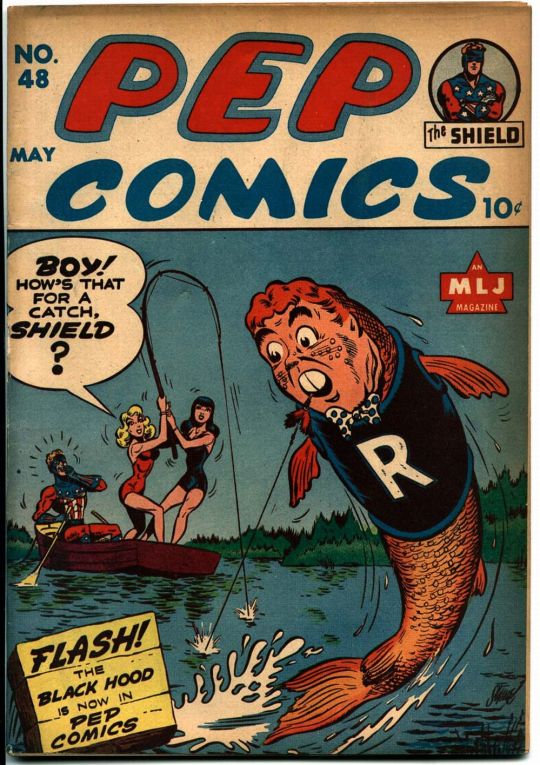
At first the Archie story isn’t even mentioned on the cover, but Archie himself slowly starts appearing on the cover, always with PEP’s big star at the time, The Shield. The Shield on the cover is at first much larger than Archie, but he shrinks over time, and after Veronica’s introduction, she and Betty start to feature on covers as well. The Shield continues shrinking...
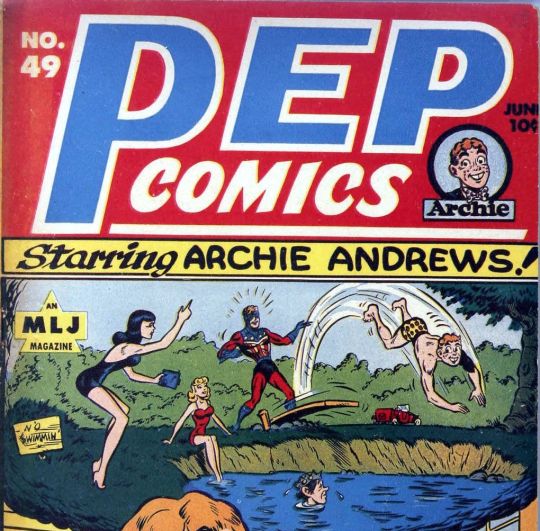
And by issue #49, the magazine is PEP Comics: Starring Archie Andrews! Archie quickly becomes its own imprint, and the only one of PEP’s lineup that survives into the present day. Ads in the magazine advertise an Archie radio show that was spurred by what was a apparently a massive outpouring of interest from PEP’s teenage subscribers. The concept of teenagerhood itself was a new invention dating from 1944. Archie’s reality included things like school, dating, and modern teen problems like trying to maintain a car and deal with wartime rationing.

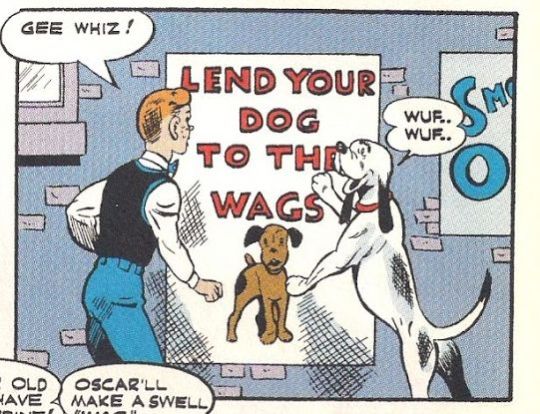
Also, sending your dog to fight Nazis. (Note: the above are two separate stories; no Nazis ever actually invaded Riverdale. Oscar, Archie’s dog, gave birth on at least two occasions, including during her army tour, and eventually faded from existence.)
At this stage, minstrel-style caricatures of black men appear on occasion in Riverdale (as train attendants and no-account bums who steal clothing out of the trash), and Yellow Peril-style caricatures of Japanese people are a regular fixture in other PEP features like “Captain Commando and the Boy Soldiers”. As a side note, Chinese people are depicted quite differently in Captain Commando. At this point in US history, they were seen as important potential allies in the war against the Japanese. In Captain Commando, they’re drawn like actual humans in comparison to Japanese soldiers. One story shows a Chinese warrior who’s been bamboozled by foolish Buddhist ideals of peace, but finally snaps out of it and gets his followers to join up with US forces in resisting Japanese occupiers. Chinese-Americans were depicted less frequently, but also running in PEP for a time was a rather remarkable depiction (for the time) of a Chinese-American hero: Fu Chang, International Detective. Chinese people would later be collapsed into the Yellow Peril phenomenon in US pop culture and there were some very racist depictions within Archie Comics, but in the 40s there was a different perspective on display for a while.
(Captain Commando and his Boy Soldiers have since lapsed into the public domain; evidently the heroic quality of child soldiers lost its gleam after WWII and reviving the property was never deemed profitable.)
Also in the 40s, many, many stories end with a quite literal punchline in which Archie gets taken out to the woodshed and beaten by his father for causing trouble. This was PEP’s light-hearted humorous fare that apparently spoke quite deeply to a teenage audience of this era. The depiction of corporal punishment is neither “pro” nor “anti”, it’s simply an unavoidable consequence handed down from on high. Archie’s misadventures lead inevitably to physical punishment from an authority figure, no matter how much or how little he’s to blame for things going wrong. Mr. Andrews himself is sometimes a figure of fun during this period, but the 40s and 50s are the time when he most often feels like a self-insert for the writers and artists, who would have been closer to his position in life than Archie’s.
Archie’s position, though, isn’t entirely as the object of abuse. It’s pretty safe to assume that the writers and artists also grew up with corporal punishment and can sympathize with the experience--though they’ve now entered the stage of life where they understand that it was done only for their own good. Archie at the end of these stories is both resentful and rueful; he wishes it hadn’t happened, but there’s no room in the pages of PEP to contemplate a world where it doesn’t have to.
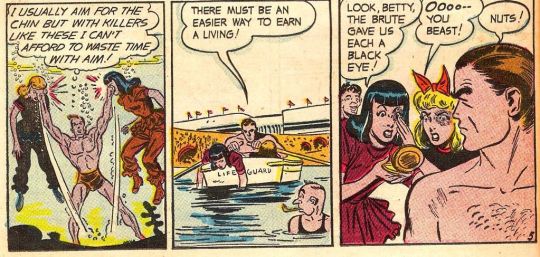
Violence was much more accepted in the 40s, including against the girls themselves--for their own good, in this case, but it’s still jarring to see a man give Betty and Veronica black eyes. Their crime in this case was, of course, being so silly and man-crazy that they nearly drowned him and themselves.
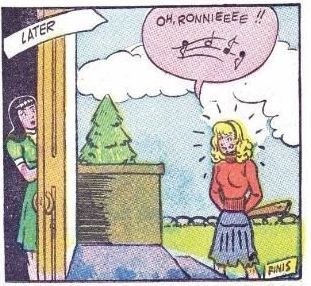

Often the violence was more cartoonish in nature, but it was only in the 40s that you’d see Betty showing up at Veronica’s door with Moe Szyslak’s weapon of choice.

The porter in this panel is one of the kindest portrayals of a black man in this period; the others (and the one depiction of a black woman that I noticed) are frankly unreproducible without heavy content warnings. Also in the 40s, fat and/or ugly women exist only as an object of fun or outright cruelty.

Vague “reducing plans” were advertised in the pages of Archie in the 1940s. This particular method was, as the name suggests, seaweed pills that were also marketed as chewing gum.
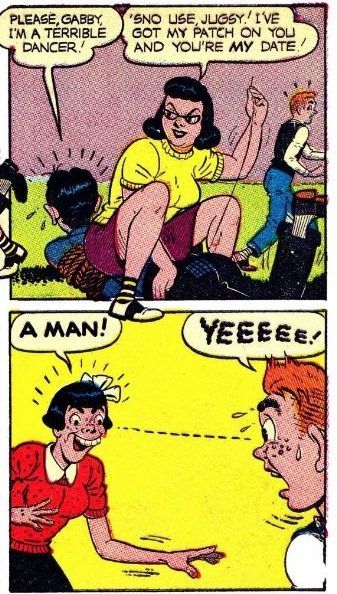
You may notice in some stories that the “ugly” and undesirable woman has very nearly the same face as Archie himself; the irony here is very likely unintentional. It’s rarely (seriously) suggested that there’s anything morally wrong with Archie aspiring to a girl much prettier than he is, but an ugly girl expressing interest in any boy is a figure of fun right up into... well, the present day. The Gabby pictured in the panel above her was a semi-recurring character, one of the only plus-size recurring characters ever depicted in Archie. As her name suggests, she was a gossip and one of the undesirable girls, but she was sometimes allowed to be friendly with Veronica or Betty without immediate karmic punishment. She’s also notable because she’s not only one of the only plus-size characters, she’s one of the very few plus-size female or teenage characters. Mr. Andrews, Mr. Weatherbee and Pop Tate all survived the 40s, but Gabby didn’t.
Betty at the inception of “Archie” (the comic) was just Girl. She rather liked Archie and he liked her, and he would try to impress/date her but end up having his monthly funny adventure. But only once Veronica was introduced did she start to gain more dimension, this time as Other Girl. Veronica was rather nice to begin with and it took a short while for them to start getting played off each other as “characters”. There was still little difference. Veronica was always rich and as a result became snooty fairly quickly, but her flaws were the flaws of an object. They existed to create difficulties for Archie, in his struggle to impress her, and Betty was differentiated only by not being snooty.


When Betty and Veronica were allies, it was because Archie had blown it somehow, and they were naturally compelled to be allies by virtue of both being girls. (When they didn’t like each other, it was also because they were both girls, and such was the natural state of being girls.) The panel above--both in the same pose, their identical faces lifted in scorn towards all men--would be echoed in other later stories, whether by chance or by accident.


Their posing in the 40s was frankly pretty ludicrous and transparent in its intentions.

Sexual attraction wasn’t explicitly commented on in the 40s comics in the way we understand “explicit” today, but it’s allowed to exist more openly than in later years. The va-va-voom effect highlighting the breasts would have to become more euphemistic as the decades passed.

In general, there was very little pretense in the 40s.

Artists had no qualms about showing the girls nearly in the nude (I cropped out a panel of Veronica in the bath above), nor about showing adult men leering at them. Even Mr. Weatherbee was occasionally moved by their charms. Generally adult men were “punished” for showing visible attraction, but only in humorous ways. It was more common for the teenage boys to drool over the girls, but the only disapproval shown when grown men did it came from women their own age, playing the role of scold or prudish spinster. There was also the occasional gag in which an adult man was misunderstood as a “masher” or peeper and received undeserved punishment from the supposed target.
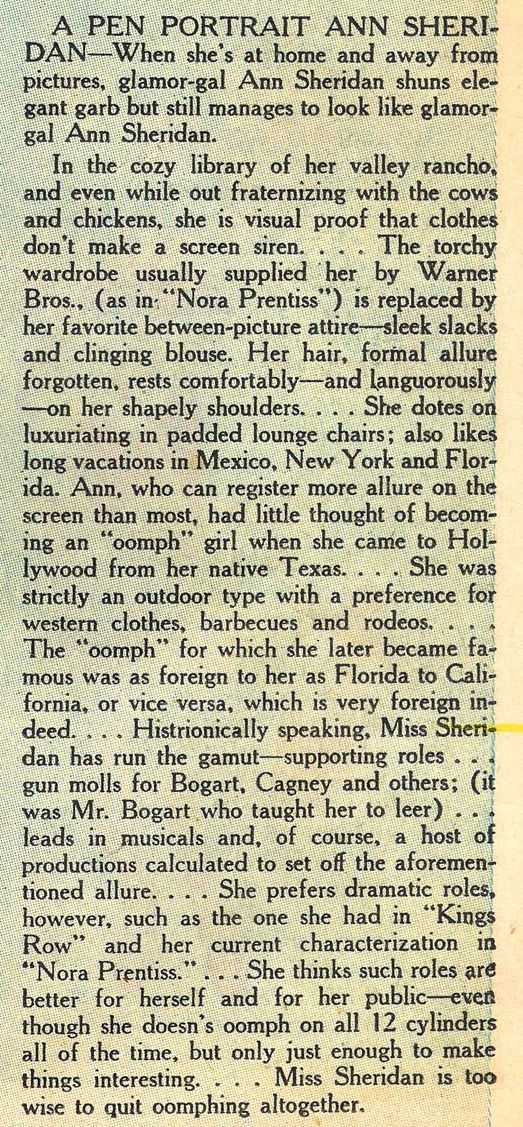
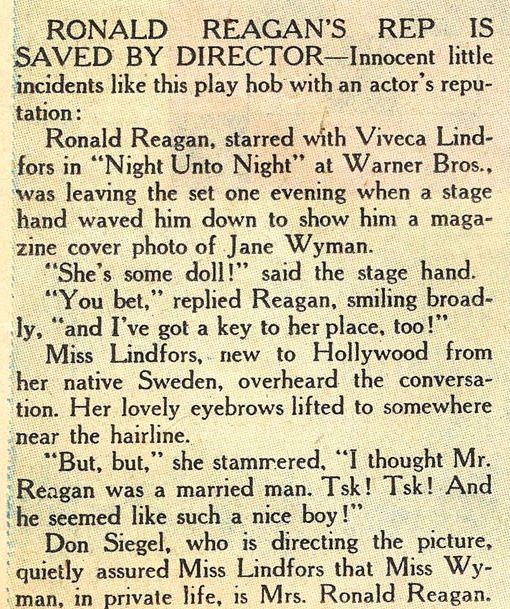
There were various write-ups of celebrity activity in the 40s and 50s, and there too the attitudes towards women were pretty much what you’d expect, but even in the late 1940s the realities of life were not entirely veiled from teenage eyes. There was room for what would now be considered adult jokes.

Also in the 40s, Archie cross-dressed, like, a lot, in a way that noticeably vanished once the 50s rolls around. It’s always as a gag, and it’s usually noted that he makes an ugly girl, but in this era it seems to have been an idea that could be poked fun at without threatening the moral fiber of all America by the mere suggestion.

In fact, one semi-famous 1948 story, “The Battle of the Jitterbugs” (reproduced more fully elsewhere) revolves entirely around the girls and the boys competing in a “fair contest’ to see which sex is better at dancing--since boys only lead and girls only follow, it’s impossible to determine who can dance better overall. The obvious solution is for two girls to dance with each other and two boys to dance with each other.

Crucially, the idea is suggested by Reggie, the prankster of the group, framing it as a joke from its inception. Archie, the main character, follows through with it as a means of asserting male superiority. There’s also no possibility that two boys could dance, or two girls could dance, without the conceit of one performing the role of the opposite gender. But in practice, the whole thing does involve a lengthy depiction of two boys dancing together, and indeed, jokingly flirting with each other.


Again, the joke-flirting comes in the form of mocking from Reggie, both en femme and en homme. Archie, the protagonist and everyman, is uncomfortable throughout and finally throws Reggie right out Pop Tate’s door after Reggie goes too far in impugning his masculinity.
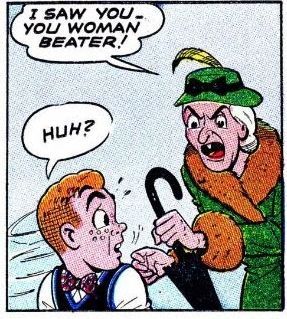

At this stage, the usual band of crones step in to punish him for imagined crimes against women, and he finishes the story sitting in bed with a broken leg, making a pronouncement that stands out rather sharply to the modern eye: “Confidentially, Jug! I’m no longer interested in women... or dancing!”

Veronica and Betty are significantly more comfortable with each other. In fact, it’s a rare 1940s story where they don’t quarrel with each other at all! Veronica’s femininity is seemingly unthreatened by the hat and pants, even though Archie Comics would continue issuing dire warnings against women in pants up through the mid-1970s.


It’s hard to imagine they lost after this! The tone of this page is downright celebratory, a rare occasion of early Betty and Veronica working together and coming out the victors of the story, not by one of them winning Archie, but by both of them showing their own skill at something without trying to show the other up. “Battle of the Jitterbugs” is a true rarity in these early years, a depiction of female triumph that doesn’t exactly defy the era’s pop culture as a whole--women were creating their own art even in the 1940s--but it does defy nearly every other Archie story up to the mid-1970s.
#archie comics#archieganda#i couldn't possibly put enough content warnings on this#content warning just about everything
12 notes
·
View notes
Note
1-11 Scott/Posey Stans always try to deflect criticism of the way Scott McCall is written in Teen Wolf by claiming that ANY attempt by a fan, a viewer, or a critic of holding Scott to a level of behavior that one would expect of a character who is a main and the self-proclaimed hero of the show is “racism”. Except that their accusations don’t make any sense whatsoever, because Scott’s canonical shitty actions and behavior don’t stem from his race (or canonical lack of thereof.)
Okay hun, this is a doozy, so I’m putting it under a Read More.
2-11 Scott McCall is mean. He’s mean to Stiles, he’s mean to Allison, he’s mean to Derek, he’s mean to Peter, he’s mean to Cora, he’s mean to Lydia, he’s mean to Jackson, he’s mean to Erica, he’s mean to Isaac, he’s mean to Malia, he’s mean to Malia, he’s mean to Kira, he’s mean to Liam, he’s mean to Chris, and he’s even mean to Theo (“You are barely even human!”) Scott McCall is deliberately rude to the Hales, Boyd, Ethan, Danny, Hayden, Jiang, Tierney, and Melissa.
3-11 Scott McCall deliberately USES, INSULTS, HUMILIATES and DEHUMANIZES people in ways that demonstrate that he is fully aware of what he’s doing. Scott McCall deliberately disregards other people’s needs in order to fulfill his own. Tyler Posey being half Mexican doesn’t change the fact that his fictional character Scott McCall is a whiny coward and an abusive piece of trash,
4-11 and that his so called ‘defense squad’ enjoys the power fantasy that Scott can be cruel, can lie, can assault, can lash out, can violate other people’s boundaries, bodily autonomy and consent, can commit premeditated murder, can break the law without impunity, can dehumanize, can gaslight and victim blame his friends to his heart’s content and no one should ever hold it against him
5-11 In both the production and in some Scott supremacist fanfics, there’s often the premise that people are evil and in the wrong if they call Scott out on his bullshit or hold his toxic behavior against him. Take Season 1. As much as the Scott McCall defense squad brigade love framing Stiles and Derek getting shit done and prioritizing people’s life over Scott’s jealous fits and temper tantrums as the height of depravity
6-11 Scott/Posey Stans consciously and steadfastly ignore all the cruel things that Scott says and does throughout the seasons, such as “How much Adderall have you had today?” OR “What are you trying to do?! I just made first line! I got a date with a girl who I can't believe wants to go out with me and everything in my life is perfect! Why are you trying to ruin it?!” OR “The hunters had a reason to slaughter your entire family and pack”
7-11 (As an aside, it’s amazing to me how Fanon rewrites Scott as this brilliant thinker and strategist and mastermind who is so much smarter and better than everyone else in every way even though Canon Scott spends the entirety of Teen Wolf doing absolutely nothing except get his ass handed to him by everyone, whining about wanting to be popular/get his dick wet/play lacrosse, screaming at his friends and girlfriends, being utterly useless when left to his own devices,
8-11 and planning to bite Stiles against his will because he doesn’t know what to do. But I digress.) Or take Season 5. In the rain argument in Lies of Omission (5x09), Scott McCall’s hypocritical, dehumanizing speech to Stiles is one of the meanest, cruelest, most disgusting manipulations I have ever seen a television character deliver to another television character they supposedly cared about. It’s victim blaming and gaslighting at its vilest.
9-11 And, of course, the Scott McCall defense squad focuses exclusively on the idea that Stiles didn’t behave “the right way” in that scene (AKA taking Scott’s bullshit without clapping back like Scott wanted and demanded), and cannot entertain for one moment the idea that Scott provoked that response by dehumanizing Stiles and by accusing Stiles of being a violent, dangerous, inhuman monster and serial killer based on Theo’s words alone.
10-11 After all, it’s part of their power fantasy. Scott being “abandoned” and “mistreated” by his “ungrateful” friends serves another type of fantasy: the poor oppressed martyr. It doesn’t matter why Scott is abandoned or who is leaving Scott, it’s all about Scott McCall’s right to own people and demand his friends’ love, friendship, loyalty, sympathy, forgiveness, obedience and devotion without having to account for his own abusive behavior.
11-11 And that’s Scott Stans’ point: Only Scott McCall Is Important and Damn Derek/Stiles/Liam/Other Teen Wolf character for having a life and motivations that don’t revolve around Scott! To them (and to Canon Scott), the pack exists not to serve all its members, but to serve and validate Scott McWhinyCall. Because, after all, that’s what antis want for themselves – validation in the face of shortcomings and bad behavior.
Wow, that was a lot of anger. Do you feel any better after venting that? I really hope so, it honestly looks p cathartic. Okay, I apologize in advance if I don’t come across as quite so passionate, I’m kinda bleh today and I already used up all my righteous fury in an earlier post, so I’ll do my best.
I honestly understand the worry about people disliking Scott as having racist motivations. As I said in another post, there aren’t a lot of Latino (wait, I read somewhere to use latine? Should I use that instead? I’ll use that, someone correct me if I’m wrong. The thing also said latinx was not great bc of pronunciation issues? I’m not educated enough on this. Halp, please.) Latine protagonist characters in popular television, especially for teen dramas like Teen Wolf. Intentional or not, written into the show or not, Scott is half-latine. His mother is a latine woman. We don’t see them speak spanish or take part in any specific cultural traditions, but that doesn’t make him white. Yes, his character was written for a white guy, but Tyler Posey is the one who got the part and we can’t strip him of his heritage just because the show originally meant for Scott to be white. My husband is almost always mistaken for white, even though he’s also half-latine, but that doesn’t make him any less latine. There’s little enough representation as it is, and if we start being picky about whether characters were ‘intended’ or ‘written’ as POC, everything will just fall to shit. Plus, as a white person, I have literally no rights to decide that Scott’s white. I’m cool with that. Would prefer to just stay in my lane, if I’m honest. With Scott established as being a POC, it’s totally reasonable for other POC and fans of Scott to be worried that those of us who don’t like him have that opinion because of either passive or active racism. There are a lot of occasions where Protags of Color were either liked less, or actively disliked for just being ‘not white.’ It also doesn’t help that Scott is one of very few “good” Characters of Color in TW (whether we agree or not, he is presented as a ‘good guy’). We have Boyd, who dies in 3A and doesn’t get much character developement in the meantime, and Kira, who sticks around for a while, then has to leave because of ‘losing control’ which is apparently a very common stereotype for POC, especially within Fantasy or Supernatural settings. Other than them, the other POC are either bad guys or just morally dubious. I’m not sure where Deaton falls on the scale either. I understand it being frustrating to some people for us to take one of the few “good’ characters and see him/describe him as a villain. It’s important for white people, and honestly, anyone not latine (because even POC can be racist against people who aren’t their race) to be self-aware and analyze the various reasons why we dislike Scott and make sure that we aren’t accidentally being passively racist. Just because we’re sure we aren’t, doesn’t mean we shouldn’t double check. And if we find we are, then it’s up to us to correct that mindset and educate ourselves. There is no shame in learning that you have not great habits or mindsets and working to fix them. That’s how growth works. It’s equally important that when we’re writing fic, we watch how we portray him and the other POC in the show. I’m not saying we can’t write Scott bashing fic. Fuck knows that I’ve written plenty of Bad Friend Scott McCall fic, and I don’t intend to stop. But we still need to be self-critical and make sure that we’re not writing Scott (or the others, please assume from here on out I’m saying Scott and the others) into racist stereotypes. We shouldn’t reduce him to just a “Yes” man, or make him constantly submissive, or constantly vicious and angry and mean for no reason. It’s one thing to write him as doing something bad or cruel and making it realistic for the story. It’s quite another to have him just randomly pop in to say “fuck you” and hit someone (I’m not referencing something specific here, I’m just saying dumb stuff). Honestly, I don’t know enough about this and I’m not really entitled to go into too much more detail. Instead, I’d recommend that even if you don’t think you’re hating Scott for racist reasons, still read This Post about racism in fandom/fanfic. When I read it, it was both reassuring and intimidating. I have anxiety, so I’m usually worried about doing things for ‘the wrong reason’ even when that’s not actually my reason for doing the thing. Reading this gave me a clearer view of my own thoughts, and it honestly made me feel a little more comfortable with my own mentality because it gave me a structure to think about and consider when I’m worried that I’m doing something racist. It’s worth the read. I’d also like to reiterate the suggestion on that post, to check out the blog Writing with Color, which is a great resource for writing Characters of Color. It doesn’t have as many resources for fanfiction writing and the grey area involved in writing characters that your reader already knows, but their ask box is closed at the moment, so maybe when it opens again someone’ll send in an ask about it (If I actually remember to, I’ll do it myself, but that’s unlikely, so if one of you feels so inspired, please do so and help a fic writer out!)
Now. I cannot speak for every single fan of TW who is anti-Scott in some way. Obviously not. But, I can speak for myself and for the experiences I’ve had within the fandom. My issues with Scott are many and complex and a lot of it is intrinsically connected to issues with the writing of the show in general and with the creators and the calls they made. In all the conversations that I’ve had with other fans, I’ve never seen anyone list Scott’s race as a problem. I’ve never seen anyone talk about how they wished he were more submissive or more obedient. Maybe that he would listen to actual adults once in a while, but not that he be unreasonably obedient of white characters. I’m not all-knowing on the subject of racist stereotypes, but nearly every complaint I’ve seen was based on details from the show and specific moments and dialogue, not just a general disgust with his existence. Furthermore, for all the anger I see directed at those of us that prefer Stiles, Derek, or even Peter, I’ve also never talked to anyone who liked those characters who wasn’t willing to admit that there were plenty of points in canon where they fucked up or did something wrong. Again, I don’t know everyone in fandom, so maybe there are people who won’t admit those things, but they aren’t in the majority.
I personally hate the way I see Scott treat people in the show. I hate the really vicious things he says and does and the chronic lack of self-awareness or growth. Even worse, the way the show excuses his behavior, be it intentional or not, has soured a lot of other parts of the show. The clearly impulsive moments that could easily be excused by him being a really stressed out teenager make me a lot more frustrated than they would, had I not known that he would never get better. That he would never stop saying things like that. I can’t even make myself enjoy the genuinely sweet moments with him and Allison or him and his mom, etc. I might hate that he left Stiles’ messages unanswered and skipped an entire day of school during a crisis to hang out with Allison, but I would’ve liked to enjoy their banter, the soft moments between them that are actually really nice. I can’t though, because so many other things about his character have ruined that for me.
It isn’t okay to attack people for disliking a character and throw around such charged words like “racist” and “abuse-apologist” or anything else. First off, this is fiction, and we all need to keep that in mind. These are not real people we’re talking about. Secondly, calling someone racist because they disagree with you (unless they are actively saying/doing something actually racist) isn’t okay and it isn’t an adult way to deal with things. Someone not liking a character doesn’t automatically make them racist. Someone happening to prefer a white character over a Character of Color doesn’t automatically make them racist. Sure, they might have passively racist motivations that even they don’t realize. But it is not up to strangers to come yell and call names without proof. There are plenty of reasons that have nothing to do with race (Not saying “i don’t see race.” I’m saying “Not About Race”) that I like Stiles over Scott, ranging from the fact that he’s physically more my type, to sharing a neurological condition with him, to just preferring Dylan O’Brien as an actor because he makes me fucking cry every time he cries on screen. What’s important is that we self analyze and check ourselves and our opinions to make sure that we aren’t falling into the racist habit of disliking Characters of Color for no real reason. But that isn’t something that other people can do for us, and it’s not their place to tell us what we think. Calling a stranger racist for saying they hate Scott’s behavior in the show doesn’t do anything for racial equality. It just makes people stop listening to the word ‘racist.’
There are times I seriously get frustrated with TW to the point of considering not watching anymore. Of closing my blog and stopping reading fanfic entirely because every single time I read a fic where Scott’s a ‘good guy’ or a ‘good alpha’ or where Derek is glad to be a beta again because he likes following Alpha Scott, I get squicked so badly I have to click out and just sit there for a second to settle. I can’t disentangle the things he does/says in the show from the fic.And I’ve written Good Friend Scott McCall fics. I have multiple wips where he’s either a decent person or he grows from being a dick to being a decent person. With my own work, I know that there’s an awareness to his behavior in the show and an active intent to rewrite/fix his behavior so that he is a nice person. With other people’s works, I don’t have a guarantee (unless it’s mentioned in tags or author’s notes, and I don’t expect people to have to explain themselves that way), and it personally makes me uncomfortable to read something when I don’t know if the writer actually sees Scott that way. It’s a personal preference, and one that I stick to pretty strictly.
Scott brings me no joy, and with him as the main character, I’ve come perilously close to cutting myself off from the most welcoming, loving fandom I’ve ever been a part of (except the Merlin fandom, but I don’t blame anyone who can’t compete with them. They’re fucking magical.). But I’m still here. I still love, if not the reality of the show, then all the potential I see in it when I watch. I love watching Derek and Stiles interact with each other and with the other side characters. I love seeing the glimpses of Boyd that we get, the tiny scenes of Erica, the snarky moments with Isaac. I even like Kira, though I haven’t seen a whole lot of the show where she’s in it/genuinely can’t remember it (I can’t even remember how far I’ve seen total, but I don’t think it was past S4, and I haven’t seen past S2 in months and months) and she spends most of her scenes with Scott, which just....kind of ruins the scenes for me.
That’s the glory of fandom though, of media in general. I don’t have to like Scott. I can love Derek and Stiles instead and I can choose not to read fics where Scott is a major player or an Alpha at all. I can read fics where Kira’s part of the pack without Scott ever getting involved, and see her interact with everyone else. Or fics where Boyd never dies and watch him bake or read or play lacrosse with the pack. I can curate my own experience, whether that means blocking tags or users or filtering fics, or just straight up skipping certain scenes/episodes of the show itself. I cope with my frustrations by coming on this blog and ranting about it. Yeah, this is a public space, but it’s also a space people choose to view. If they don’t like my opinions, they can block me or unfollow me or all of the above. They don’t have to read it, just like I don’t have to read any of their pro-scott stuff. I also read fic that does explore how Scott’s behavior is problematic and cruel sometimes. Fic that either erases him or turns him into the villain, I find fun and interesting and the relationship between him and Stiles cracking into pieces is something I find extremely cathartic, so I read it pretty much every chance I get (though, i’m so picky about fics I read, you’ve no idea). I also write fic. I write the most mushy, self-indulgent sterek fic and Stiles-centric fic and and Scott bashing fic that I can possibly write. It’s a joy and a therapy all its own. Fuck, I’m rewriting the entirety of canon for fuck’s sake and I’ve made so many changes that at this point I honestly have issues remembering what happens in the show, bc I rewrote the damn thing.
At the same time, Scott fans are gonna write their power fantasies. They’re gonna write anti-Stiles stuff and anti-Derek stuff, and whatever else tickles their fancy. They’re gonna make their own rant posts and gifsets. And to be quite honest, I don’t give a single flying fuck. I already have those tags filtered out on Ao3. I don’t follow any pro-scott tumblrs. That shit doesn’t show up for me most of the time, unless it’s not tagged properly, and even then I just click out, take a second, and move on.
No one is required to like or dislike specific characters, and it’s unfair of anyone to tell us otherwise. Fandom is built on choice. The choice to disagree with canon, or to re-envision it altogether, or to love it entirely. No one can take that away from you. So long as you aren’t hurting anybody, just keep doing you, friend. I’m here for you to vent to when it gets to be too much.
<3
#personal#go for it#anti-scott mccall#meta ramblings#Anonymous#rant#much love#I didn't mean to sound so preachy#oops
61 notes
·
View notes
Photo
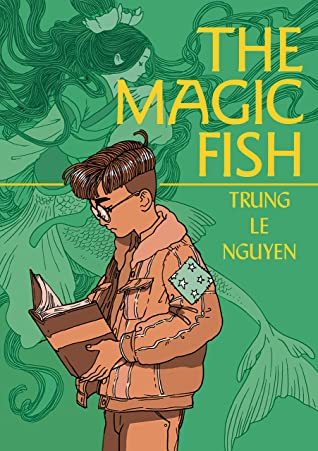


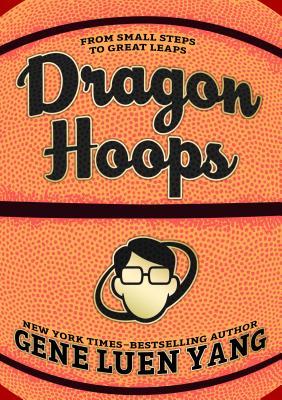
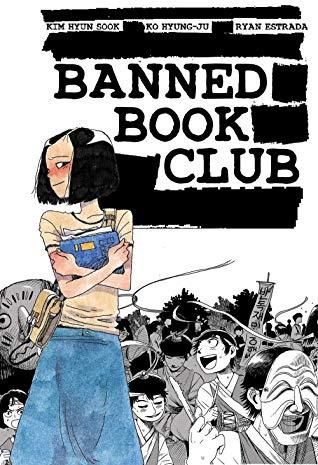

Graphic Recommendations
This year has been an excellent one for readers of graphic novels. I've been reading quite a few during the pandemic when longer form books just seem like too much of a time investment or my attention span is limited. Falling into the visuals can be just the thing I need when the world seems a bit chaotic. Here are a few I highly recommend.
The Magic Fish by Trung Le Nguyen Random House Graphic
Real life isn’t a fairytale.
But Tiến still enjoys reading his favorite stories with his parents from the books he borrows from the local library. It’s hard enough trying to communicate with your parents as a kid, but for Tiến, he doesn’t even have the right words because his parents are struggling with their English. Is there a Vietnamese word for what he’s going through?
Is there a way to tell them he’s gay?
A beautifully illustrated story by Trung Le Nguyen that follows a young boy as he tries to navigate life through fairytales, an instant classic that shows us how we are all connected. The Magic Fish tackles tough subjects in a way that accessible with readers of all ages, and teaches us that no matter what—we can all have our own happy endings. — Cover image and summary via Goodreads
Displacement by Kiku Hughes First Second [Jessica's Review]
A teenager is pulled back in time to witness her grandmother’s experiences in World War II-era Japanese internment camps in Displacement, a historical graphic novel from Kiku Hughes.
Kiku is on vacation in San Francisco when suddenly she finds herself displaced to the 1940s Japanese-American internment camp that her late grandmother, Ernestina, was forcibly relocated to during World War II.
These displacements keep occurring until Kiku finds herself “stuck” back in time. Living alongside her young grandmother and other Japanese-American citizens in internment camps, Kiku gets the education she never received in history class. She witnesses the lives of Japanese-Americans who were denied their civil liberties and suffered greatly, but managed to cultivate community and commit acts of resistance in order to survive.
Kiku Hughes weaves a riveting, bittersweet tale that highlights the intergenerational impact and power of memory. — Cover image and summary via Goodreads
Flamer by Mike Curato Henry Holt and Co.
I know I’m not gay. Gay boys like other boys. I hate boys. They’re mean, and scary, and they’re always destroying something or saying something dumb or both.
I hate that word. Gay. It makes me feel . . . unsafe.
It's the summer between middle school and high school, and Aiden Navarro is away at camp. Everyone's going through changes—but for Aiden, the stakes feel higher. As he navigates friendships, deals with bullies, and spends time with Elias (a boy he can't stop thinking about), he finds himself on a path of self-discovery and acceptance. — Cover image and summary via Goodreads
Dragon Hoops by Gene Luen Yang First Second
In his latest graphic novel, New York Times bestselling author Gene Luen Yang turns the spotlight on his life, his family, and the high school where he teaches.
Gene understands stories—comic book stories, in particular. Big action. Bigger thrills. And the hero always wins.
But Gene doesn’t get sports. As a kid, his friends called him “Stick” and every basketball game he played ended in pain. He lost interest in basketball long ago, but at the high school where he now teaches, it’s all anyone can talk about. The men’s varsity team, the Dragons, is having a phenomenal season that’s been decades in the making. Each victory brings them closer to their ultimate goal: the California State Championships.
Once Gene gets to know these young all-stars, he realizes that their story is just as thrilling as anything he’s seen on a comic book page. He knows he has to follow this epic to its end. What he doesn’t know yet is that this season is not only going to change the Dragons’s lives, but his own life as well. — Copy image and summary via Goodreads
Banned Book Club by Kim Hyun Sook, Ko Hyung-Ju, Ryan Estrada Iron Circus Comics [Crystal's review] [Q&A with Kim Hyun Sook & Ryan Estrada]
When Kim Hyun Sook started college in 1983 she was ready for her world to open up. After acing her exams and sort-of convincing her traditional mother that it was a good idea for a woman to go to college, she looked forward to soaking up the ideas of Western Literature far from the drudgery she was promised at her family’s restaurant. But literature class would prove to be just the start of a massive turning point, still focused on reading but with life-or-death stakes she never could have imagined.
This was during South Korea’s Fifth Republic, a military regime that entrenched its power through censorship, torture, and the murder of protestors. In this charged political climate, with Molotov cocktails flying and fellow students disappearing for hours and returning with bruises, Hyun Sook sought refuge in the comfort of books. When the handsome young editor of the school newspaper invited her to his reading group, she expected to pop into the cafeteria to talk about Moby Dick, Hamlet, and The Scarlet Letter. Instead she found herself hiding in a basement as the youngest member of an underground banned book club. And as Hyun Sook soon discovered, in a totalitarian regime, the delights of discovering great works of illicit literature are quickly overshadowed by fear and violence as the walls close in.
In Banned Book Club, Hyun Sook shares a dramatic true story of political division, fear-mongering, anti-intellectualism, the death of democratic institutions, and the relentless rebellion of reading. — Cover image and summary via Goodreads
Almost American Girl by Robin Ha Balzer + Bray
A powerful and timely teen graphic novel memoir—perfect for fans of American Born Chinese and Hey, Kiddo—about a Korean-born, non-English-speaking girl who is abruptly transplanted from Seoul to Huntsville, Alabama, and struggles with extreme culture shock and isolation, until she discovers her passion for comic arts.
For as long as she can remember, it’s been Robin and her mom against the world. Growing up in the 1990s as the only child of a single mother in Seoul, Korea, wasn’t always easy, but it has bonded them fiercely together.
So when a vacation to visit friends in Huntsville, Alabama, unexpectedly becomes a permanent relocation—following her mother’s announcement that she’s getting married—Robin is devastated. Overnight, her life changes. She is dropped into a new school where she doesn’t understand the language and struggles to keep up. She is completely cut off from her friends at home and has no access to her beloved comics. At home, she doesn’t fit in with her new stepfamily. And worst of all, she is furious with the one person she is closest to—her mother.
Then one day Robin’s mother enrolls her in a local comic drawing class, which opens the window to a future Robin could never have imagined. — Cover image and summary via Goodreads
For a few older titles, you can check out the lists we've created in the past: LGBTQ POC Comics 3 Quick Comic Book Reads Women's History Month Getting Graphic
19 notes
·
View notes
Text
When I was fifteen years old, I found out about Star Trek: The Original Series. Back then, Star Trek as I knew was only The Next Generation, and I was apathetic about that. I found out through simple curioaity, but I had nothing to better to do so I looked into it. It sounded kind of interesting, so I found the show on Hulu and decided to give it a shot. I quit midway through the third episode. I saw it as old, cheesy looking, and dumb. Why waste my time on something old? Over the years, the more I got involved in online fandom culture, the more I would see it pop up. The more I would ehar about how having PoC inr egular roles was revolutionary just because it showed that they existed. How the show enrained so many science fiction tropes and ideals into modern Americn media in the vein as Dotor Who has in Britian. Heck a review show I used to watch went over the comic adptations of the films, and came off as so passionate about the franchise that I remembered my previous stance. Remembered how I threw it aside as a relic of the past, despite me even thn seeing the value as I valued classical animaiton and children’s media very highly.
IDK what provoked it, but in January of this year, I decided to watch the entirety of Star Trek. Maybe it was quarentine rentine making me snap. Maybe it was me giving in at last to those urges that had been prodding at me for years. Regardless, I made the choice, and it only made sense to begin with the one that started it all. I am now 28 years old. I have grown far more patient and respectful with the things that came before my time. Media holds a great deal of value and whether I understood it or not, Star Trek was vital to popular media. I was ready to give it a second chance. I expected to go in with a greater appreciation, but otherwise not have many strong feelings abou it. I got through those three episodes again with my feelings better than before, but not too different. But I was determined to keep going. So for two months, I watched episode after episode and this weekend I ended it with the original films. Now here we all at the end of the journey. How do I feel?
I felt very regretful for throwing it aside the way that I did.
I greatly enjoyed TOS. Far more than I had ever expected. It is very much a product of the 60’s. There was a limited budget and it showed, though they made the most of it. There were many ridiculous plots, rampant sexism, and hammy acting that is utterly laughable. Some days I could go along with it, other days I just wanted them to get it over with. And yet, none of it kept me away. There were ideals revolutionary for the time like PoC standing equal to others, themes of all kinds such as anti-war and humanity, great science fiction concepts that may be standard today but don’t rob them of their enjoyability, and so much fun but also many moments that made you think. But most of ll, it had such lovely characters. For me to care about a show, I have to care about it’s chracters. I knew a few things via pop culture, butt hat’s not the same as understanding them as a viewer and media can frequently exaggerate the reality. And as I found out, there was far more to them than what mdia lead me to believe.
Kirk I only ever knew as a brave captain who made out with a lot of women. While that’s true, I can’t call him a reckless womanizing asshole. He was brave, optimistic, diplomatic, and charming. He could be light-herted, but also very much a devoted Starfleet Captain whose duty is his entire being. I was shocked at how much I grew to care about him. Seeing his triumphs, his failings, his strengths and flaws, even on an off day I cared about him. Even when William Shatner hammed it up too much, I enjoyed seeing him. Spock was who I knew the most about consideirng how popular he was and I wasn’t sure what to expect, but I also grew to love him. His logic, his struggle with his dual being as half Vulcan and half Human, his loyalty to Kirk and his dedicaiton to his duty. I could see why he meant so much to people, esecially witht he level of depth and work that Leonard Nimoy put into the character. There’s s amny little things that you begint o notce and it makes Spock feel all the more real. But by far the biggest appeciaiton I grew was for McCoy. He was the character I knew the least about aside form him being a doctor and remembering the first episode. But GOD I love his character so much. His crankiness, snarkiness, and his arguments with Spock were entertaining but seieng how compassionate, devoted, and caring that he is especially when I watched The Empath ahead of time and saw his sacrifice... damn. Not to mention DeForest Kelley’s perormance with him imo being the best peformer aside from Nimoy. He gave it hus all even during the dumbest episodes and that always earns my respect. I didn’t think I’d care about Bones that much, knowing him as that guy who’s more important than the rest but not even close to as much as Kirk and Spock, and he walked away as my absolute favorite character who I will continue to give the love and appreciate that he deserves.
The others were great too. Scotty was funny, great at his job, and the amount fo times he saved thm all via some miracle is to be admired. Sulu was significant for being an Asian man as a regular and in a high position, and I just loved having his prescence. Uhura being a Black woman treated as an equal by her white male peers and being a dedicated, sassy communicaitons officer as well as her lovely musical talents made her a delight. Chekov when he came along added a nice, youthful prescence without him getitg annoying and having a Russian as a hero at that time was also a big deal. While the show struggled BIG TIME with gender and feminism, it was major at the time for presenting PoC and those of other nationalities as equal to others, and the cast clearly did their best to make them feel like actual people. I respect that a great deal. We all should sot hat we can keep improving from there.
I didn’t expect to care. I expected to get the show over with and have something to occupy my time. And yet, I do care. I care about these characters. I care about the shenanigains that they get involed in. I worry when they get into distress even though I know that they’ll be fine. There were plenty of things I knew in advance like Spcok’s deaht in the movies... and I cried anyways. I knew that nothing long-term bad would happen in the series, yet I feared for the cast and their situaton anyways. I grew invested in them. In their relaitonships. The Kirk-Spock-McCoy dynamic was by far my favorite thing and it kept me wanting to keepw atching. Not to occupy my time, but because I genuienly wanted to see what they got into and how they got out of it. To see Kirk and Spock’s mutual respect and trust in each other. To see Spock and McCoy argue over logic and emotion and be wiling to defend the other, to see Kirk and Bones joke and be at ease with each other as the close longitme firends that the are, and just having the three together... it was such a perfect dynamic. Hell I didn’t expect to ship anything aside form maybe Spirk due to knowing it’s significance to fandom, slash,a nd the LGBT+ community. And I came away shipping all three dynamics...a nd veering on all three together, but IDK if I’m quite there yet. But whether shippy or platonic, their relaitonship together is perfect and I loved it.
Now, the journey is over. Oh I plan to go back and do it all over again. I plan to pay even more atteniton. I plan on giving each episode as good of an analysis as I can give. I plan to try and seek out things like the novels and the comics so that I can have more itme with them. I plan to watch the reboot films to see what happes in a different universe. I plan to watch TNG and hope that I enjoy those charactrs that I ignored my entire life just as much as I did these. But for now, it’s over. It is a ride that I am thankful to have taken. I came in indifferen, and am leaving a fan looking forward to whatever else awaits. Thank you Star Trek TOS for this amazing two month journey. Thank you tot he cast and crew who put so much into it despite everything working against them. Thank you to the fans who watched it and kept it alive for all of these decades. And to those who read tot his point and all of my watchthrogh posts, thank you for sitcking with me. It was, without doubt, an experience that I’m never going to forget.
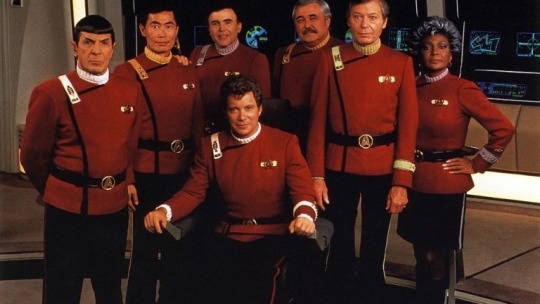
#star trek#tos#st watchthrough#god i still cant believe its over...#but at least now i ge tto do it all over again#star trek tos
14 notes
·
View notes